Tools Required
| • | J 5590 Crankshaft Sprocket Installer |
| • | J 8001 Dial Indicator Set |
| • | J 36797-A Seal Installer |
| • | J 44752 Bearing, Race, and Seal Installer |
| • | J 44753 Bearing and Seal Installer |
| • | J 44755 Holding Fixture |
| • | J 44757 Shim Selection Kit |
| • | J 44907 Bearing Installer |
| • | J 44908 Bearing Race Installer |
Important:
• The transfer case is assembled for proper gear tooth clearances, backlash, and bearing preloads with selective shims. • Do not assemble the internal components dry. Lightly lubricate the bearing races, bearings, gears, and oil seals with the proper lubricant. Components in the transaxle portion of the transfer case should be lubricated with DEXRON III GM P/N 12378470
(Canadian P/N 10952622) or equivalent. Components in the hypoid gear portion of the transfer case should be lubricated with GM P/N 12378514 (Canadian P/N 88901045).
Differential Carrier Assembly
- Install the needle bearings (4 and 6) and washer (5) to the gear (3), if required.
- Install the pin (9), gear (3), and washers (1, 2, 7, and 8) to the differential carrier, if required.
- Install the ring (10) to the carrier, if required.
- Install the side gears (2), pinion gears (3), and washers (1 and 4) to the carrier, if required.
- Install the shaft (1) and roll pin (2) to the carrier, if required.
- Determine if the driven shaft has a plus, minus, or zero value (1) etched onto the end of the gear.
- Determine if the driven shaft has a 4 digit measured value (1) etched onto the end of the gear.
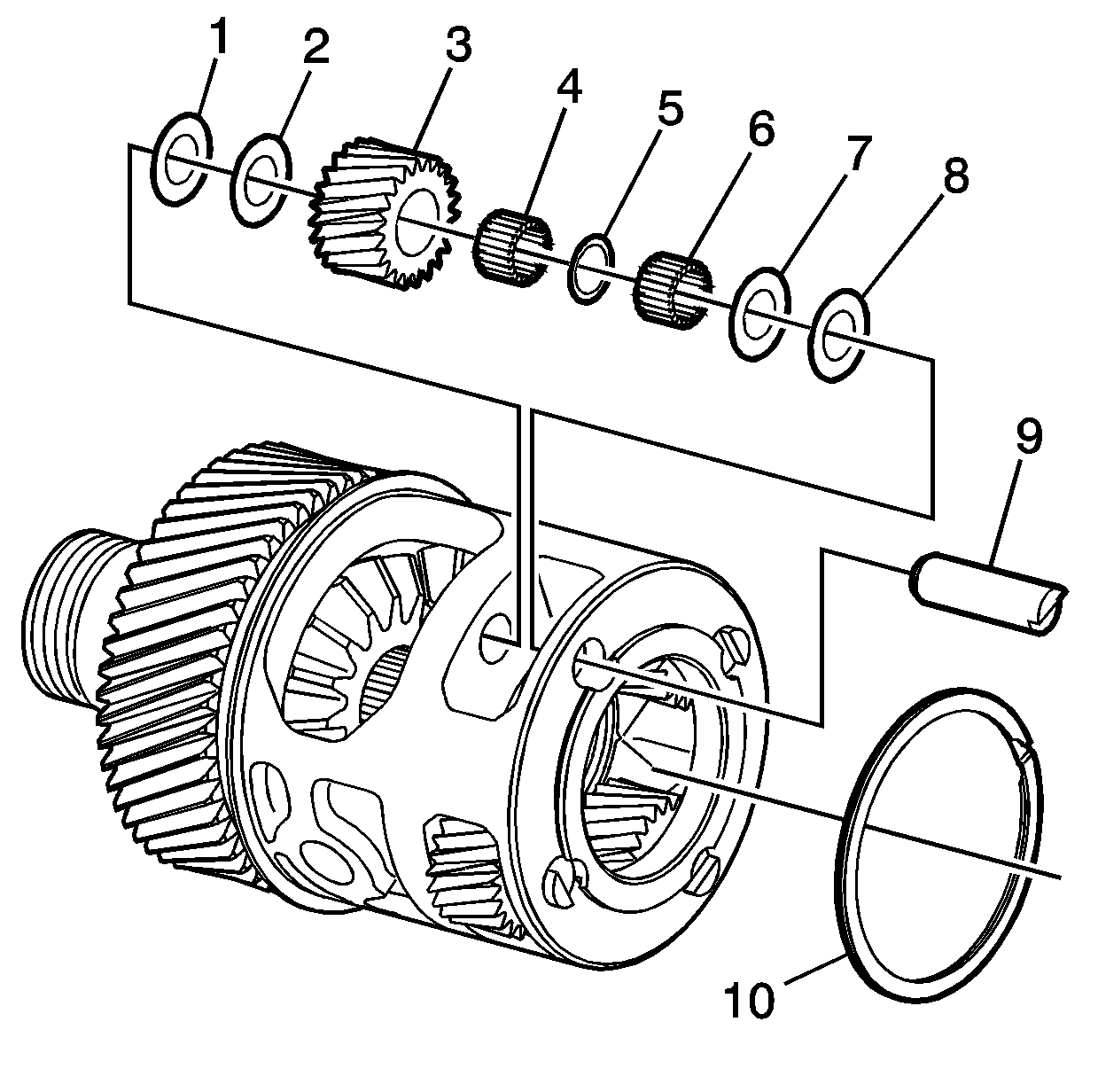
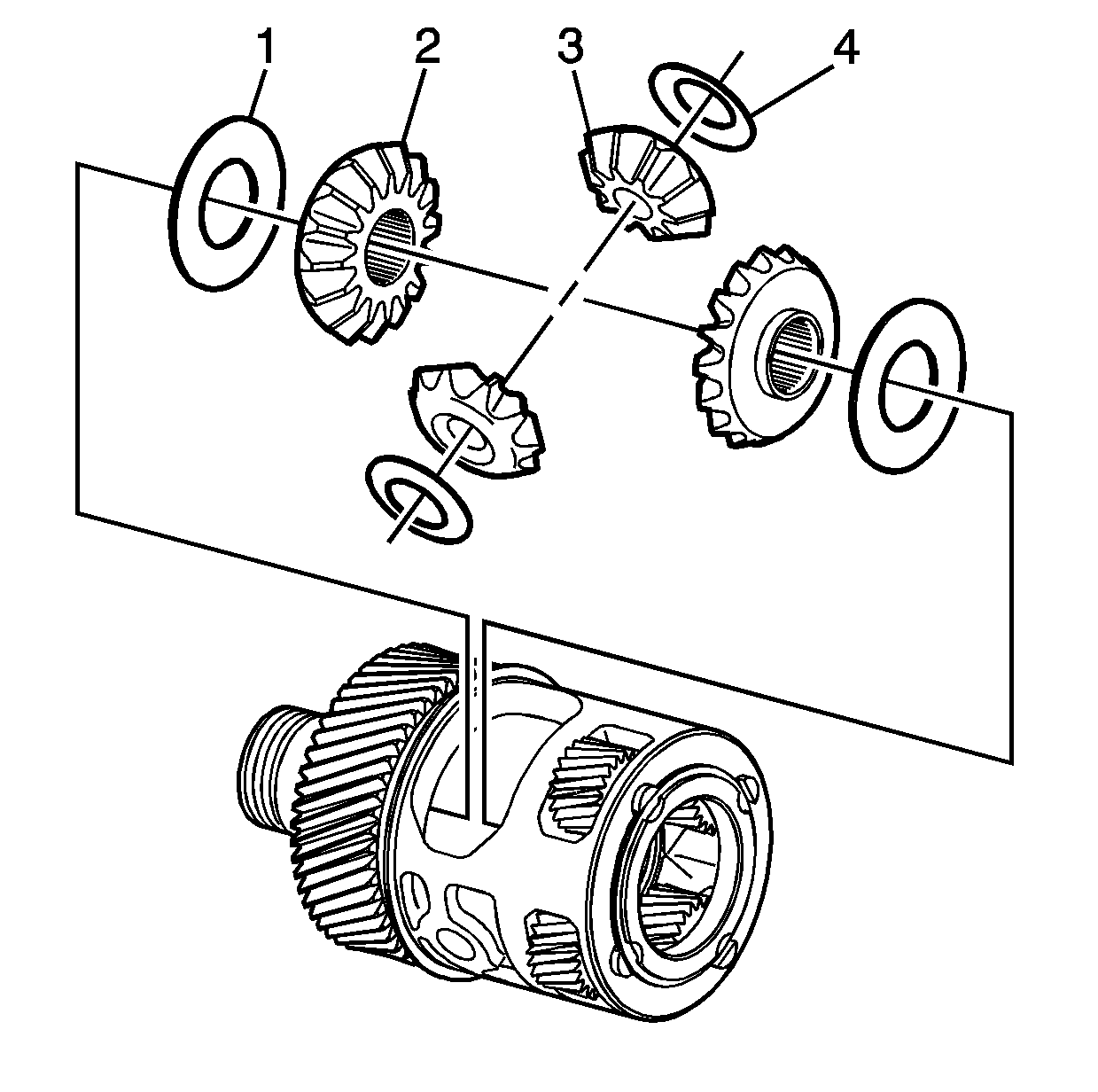
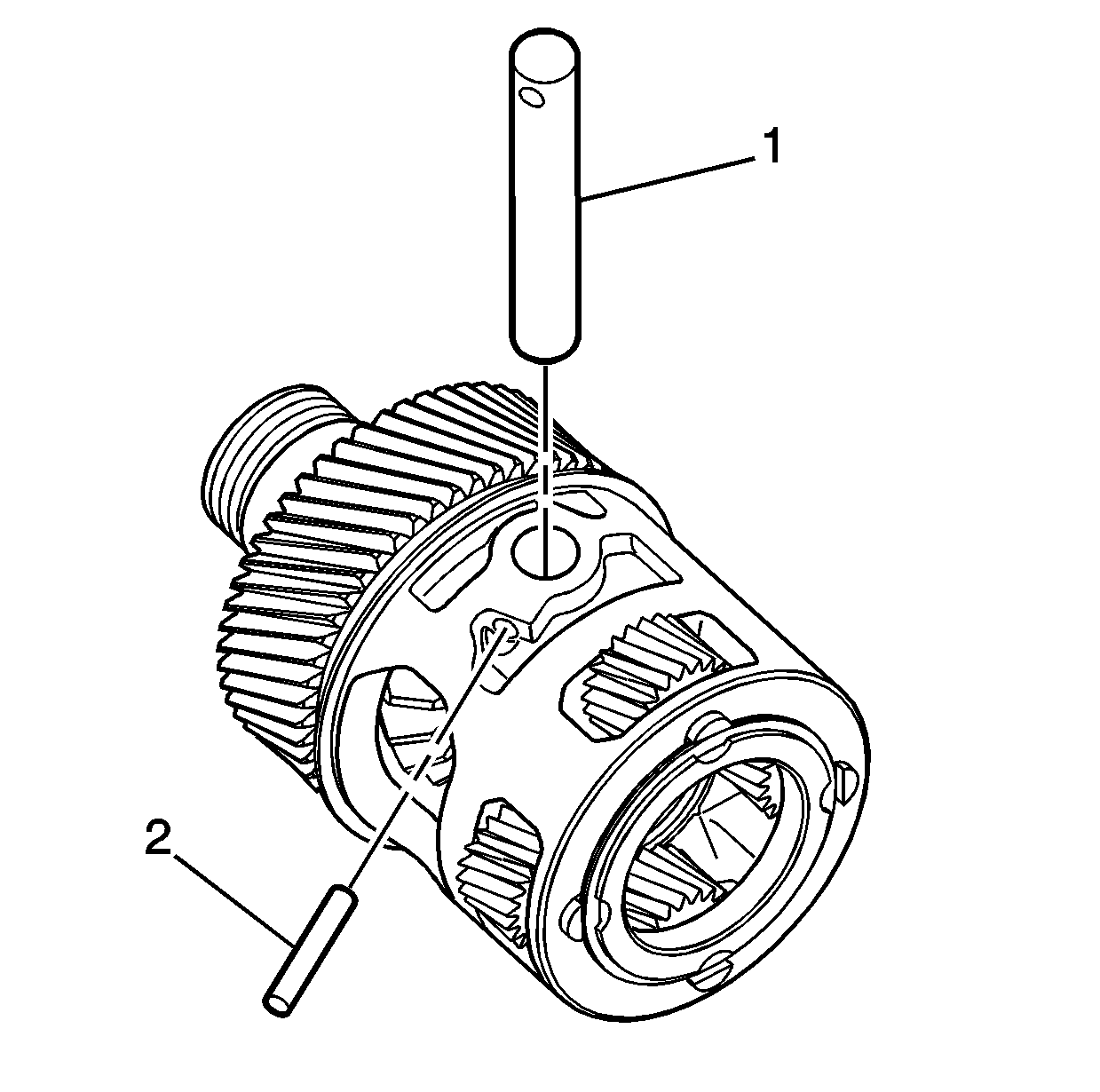
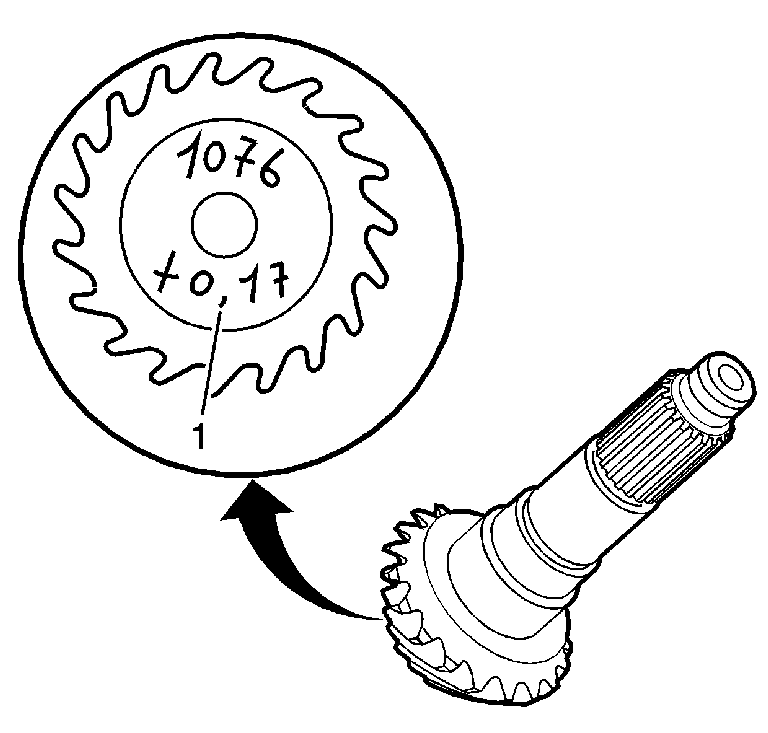
Important: A comma is to be considered a decimal point.
If the driven shaft has a plus, minus, or zero value etched onto the gear end, refer to Extension Housing Assembly and Shim Selection - Procedure A.
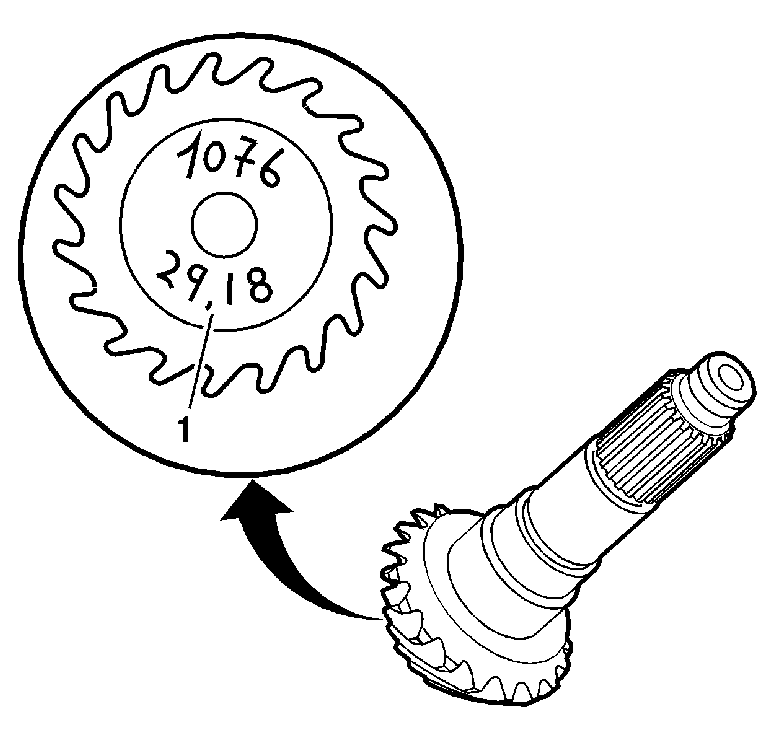
If the driven shaft has a four-digit number etched onto the gear end, refer to Extension Housing Assembly and Shim Selection - Procedure B.
Extension Housing Assembly and Shim Selection - Procedure A
- Use the J 44908 (1) and a hydraulic press in order to install the outer bearing race to the extension housing.
- Use the J 44908 (1) and a hydraulic press in order to install the inner bearing race to the extension housing.
- Measure the distance between the flange on the driven shaft and the end of the pinion. Record the value as dimension B.
- Use the J 44907 (1) and a hydraulic press in order to install the inner bearing (2) to the driven shaft.
- Install the driven shaft (3) and NEW spacer (1) into the extension housing (2).
- Use the J 5590 (1) and a hydraulic press in order to install the bearing onto the shaft.
- Use the J 36797-A (1) in order to install a new oil seal (2) into the extension housing (3).
- Lightly lubricate the splines of the driven shaft with grease.
- Install the flange (1) onto the shaft using a hydraulic press.
- Install the extension housing assembly (3) and bolts (1) to the J 44755 (2).
- Install a new nut (1) onto the shaft.
- Remove the extension housing assembly and bolts from the J 44755 .
- Measure in both directions, the rotating torque of the driven shaft. A properly assembled shaft and NEW bearings should have a rotating torque of 1.5 N·m (13 lb in). When reusing driven shaft bearings, the rotating torque should equal the value recorded during disassembly. Tighten the flange nut as required to achieve the proper rotating torque value.
- Measure the distance between the end of the pinion and the extension housing seal surface. Record the value as dimension C.
- Install the J 44757-3 (2) into the bore of the housing (1).
- Install J 44757-9 (3) and bolts (2) to the housing (1).
- Measure the distance (x) between the J 44757-3 and the J 44757-9 using a feeler gage. Add the measured value (x) to 67.3 mm (2.65 in). Record the value as dimension D.
- Determine if the driven shaft has a plus, minus, or zero value etched onto the end of the gear.
- Calculate the extension housing shim thickness. Refer to the Extension Housing Shim Calculation Table - Procedure A in General Specifications .
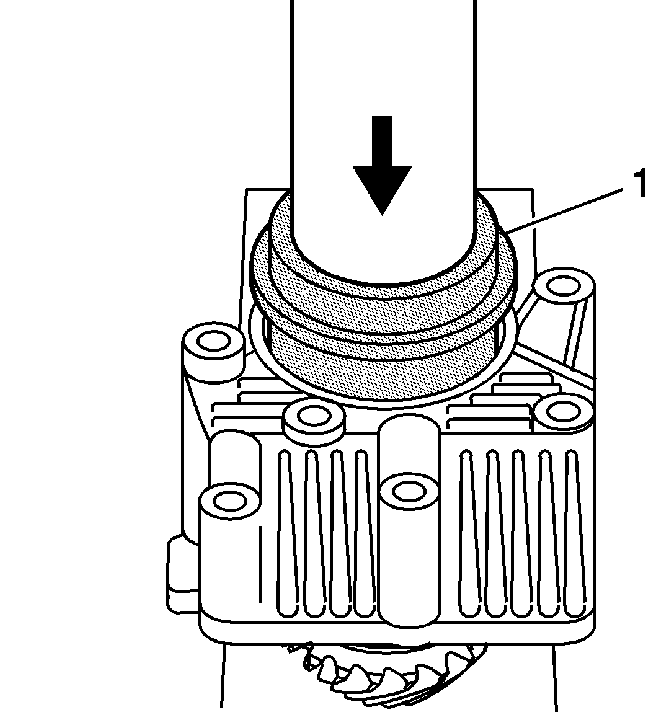
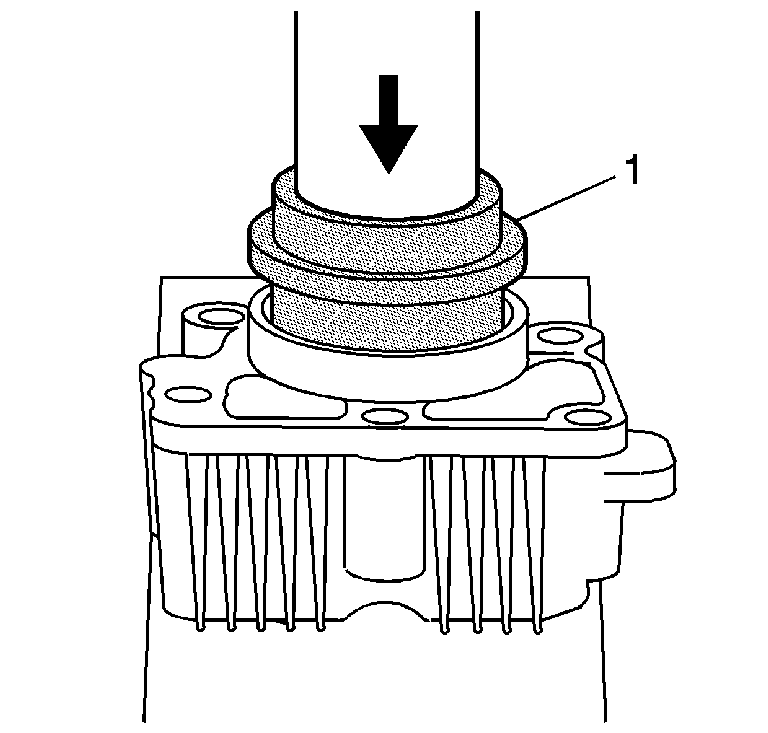
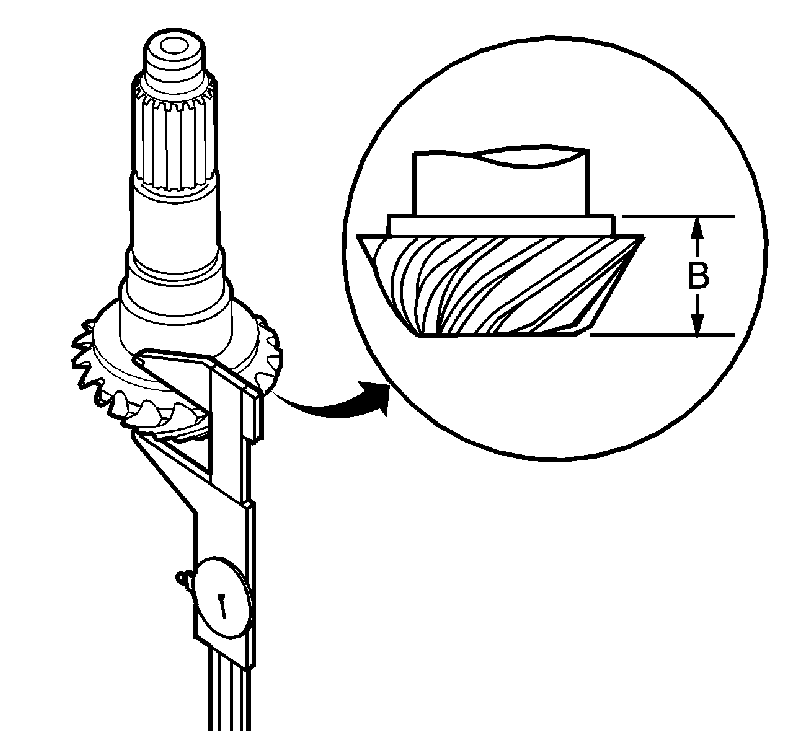
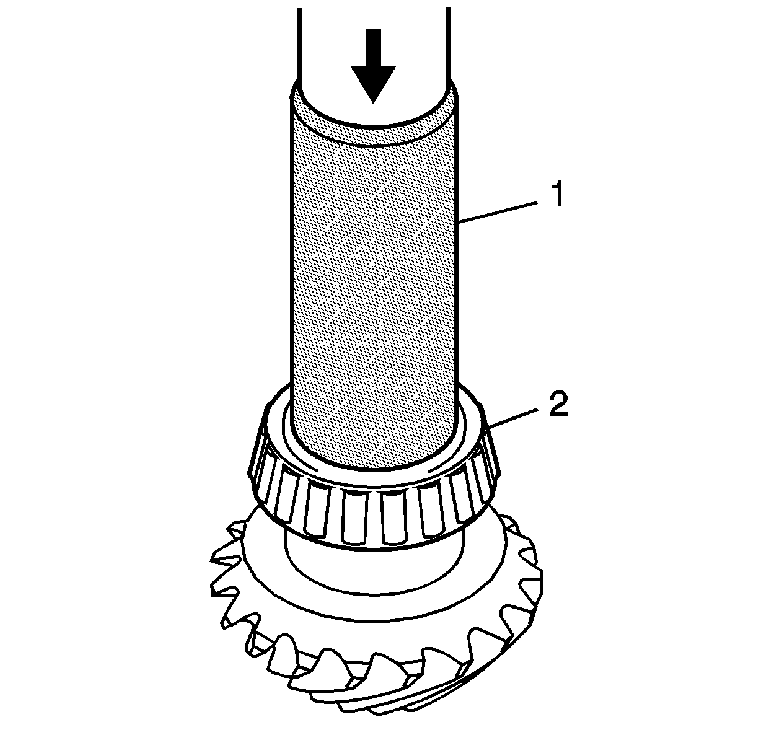
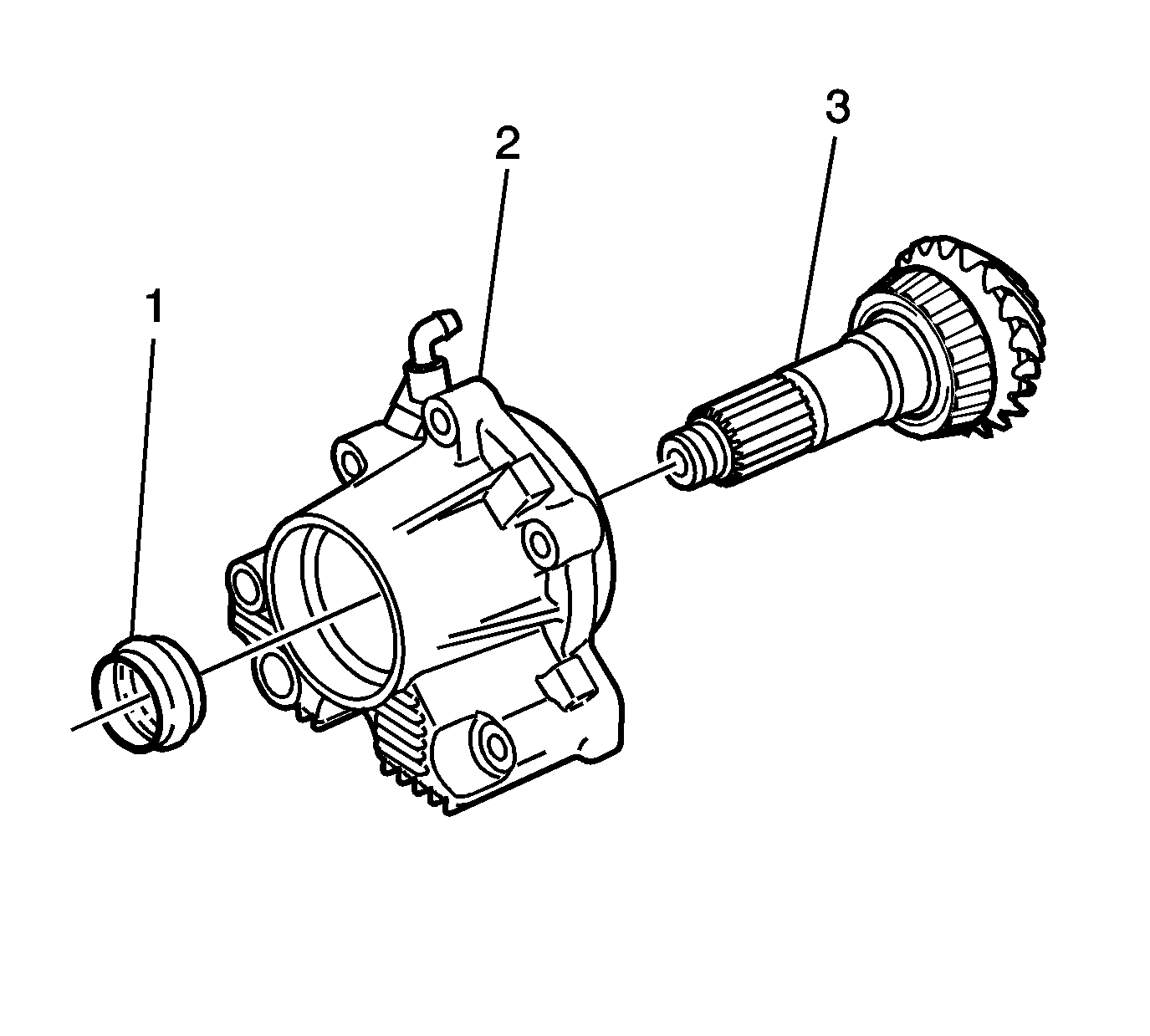
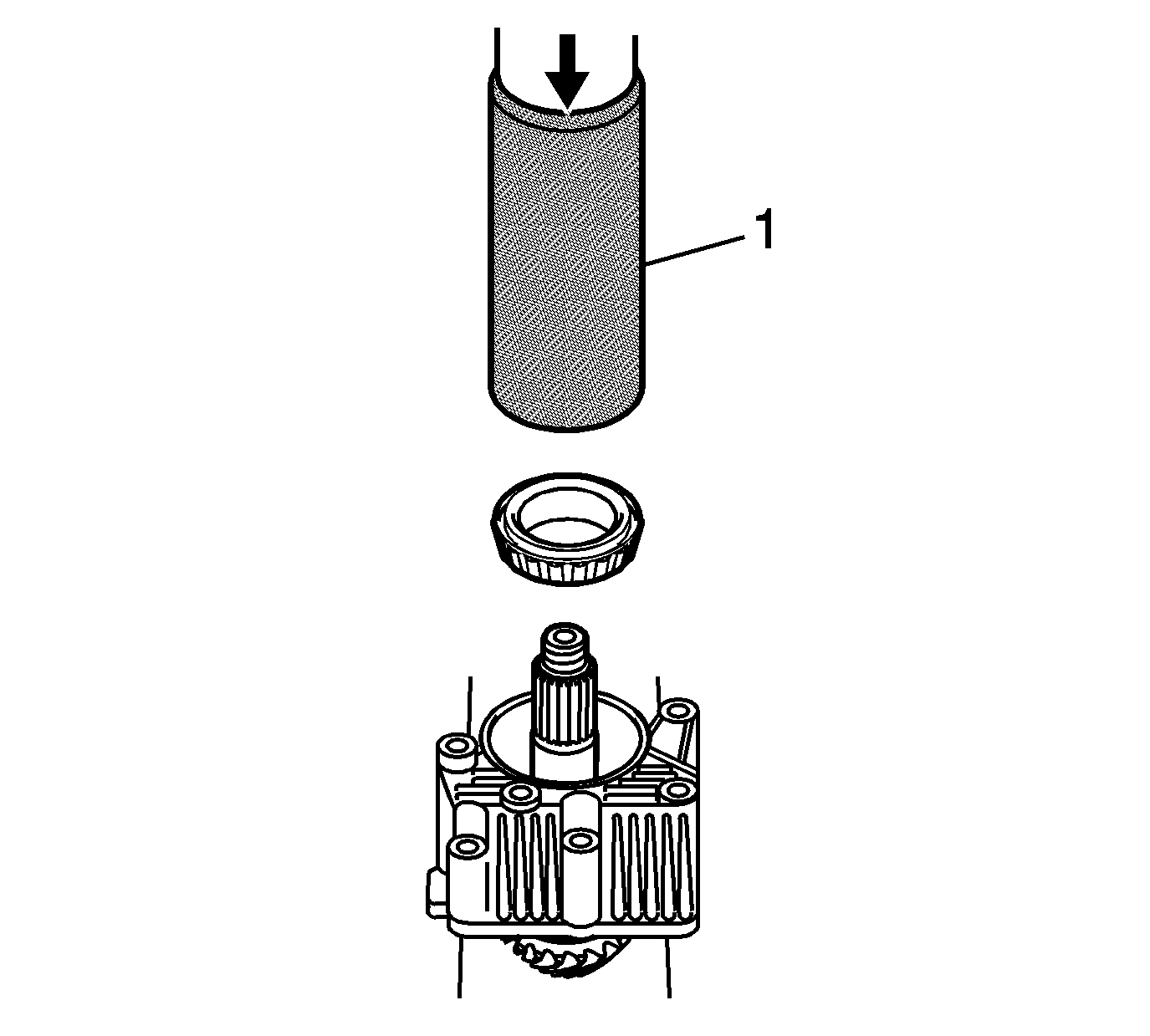
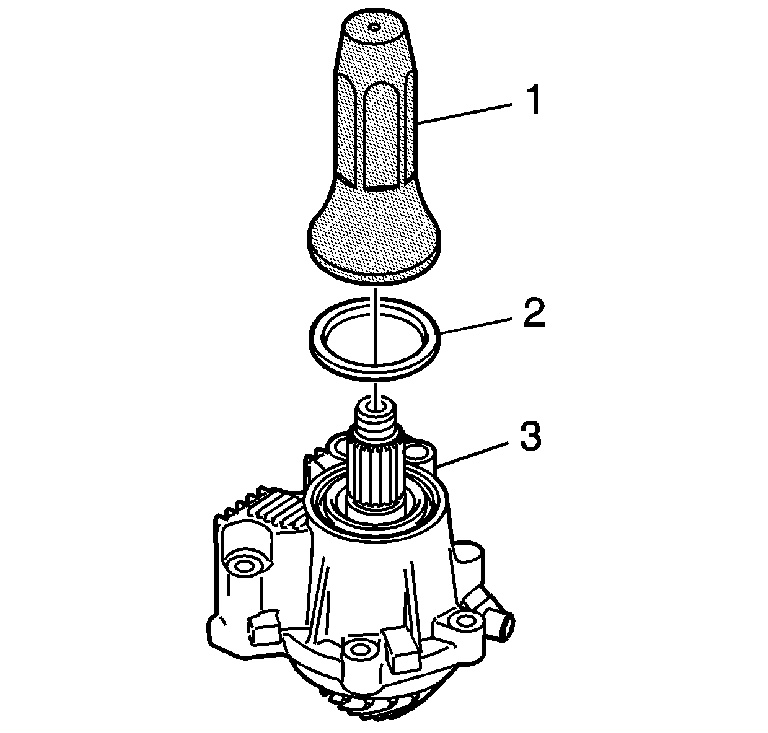
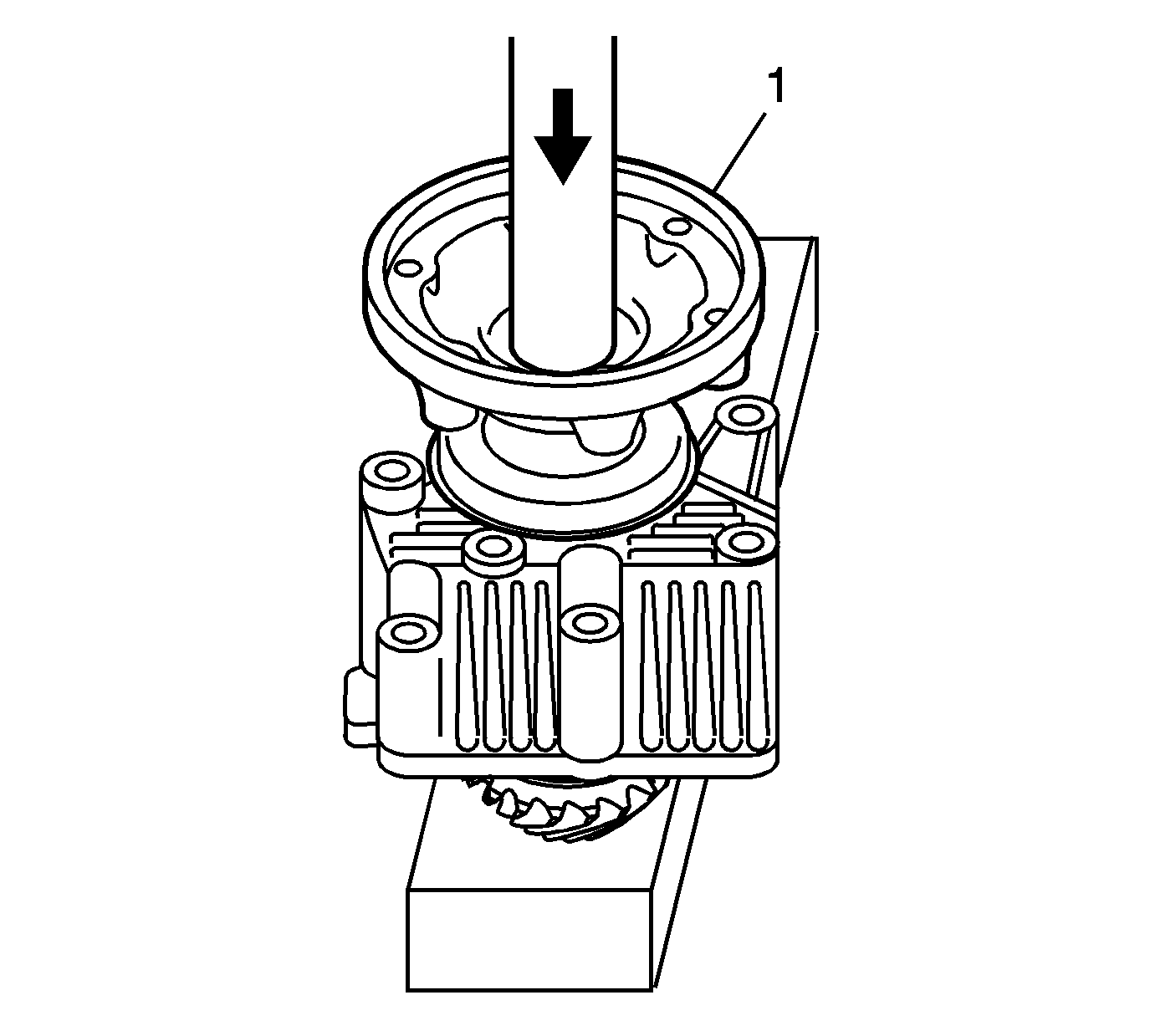
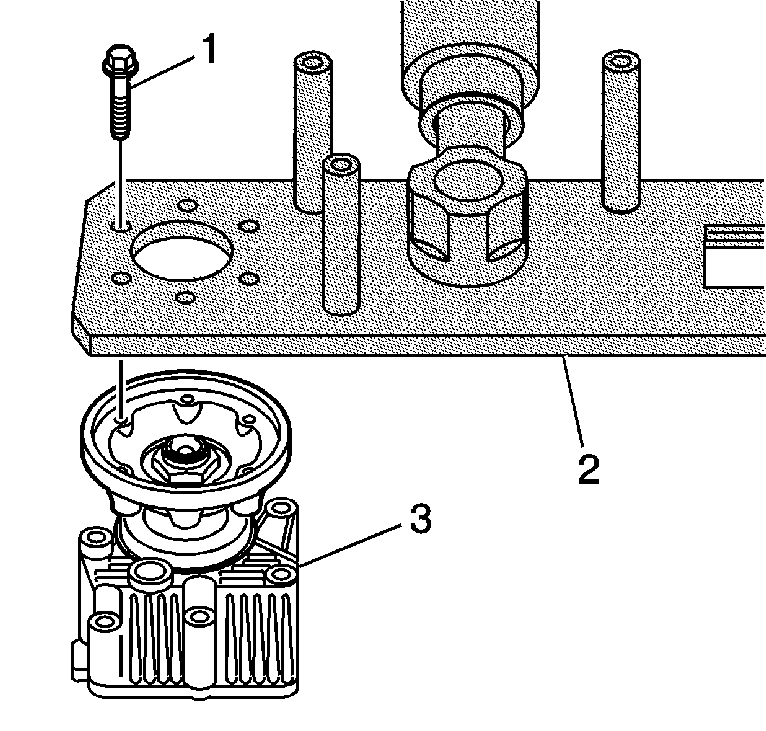
Notice: Use the correct fastener in the correct location. Replacement fasteners must be the correct part number for that application. Fasteners requiring replacement or fasteners requiring the use of thread locking compound or sealant are identified in the service procedure. Do not use paints, lubricants, or corrosion inhibitors on fasteners or fastener joint surfaces unless specified. These coatings affect fastener torque and joint clamping force and may damage the fastener. Use the correct tightening sequence and specifications when installing fasteners in order to avoid damage to parts and systems.
Tighten
Tighten the bolts to 25 N·m (18 lb ft).
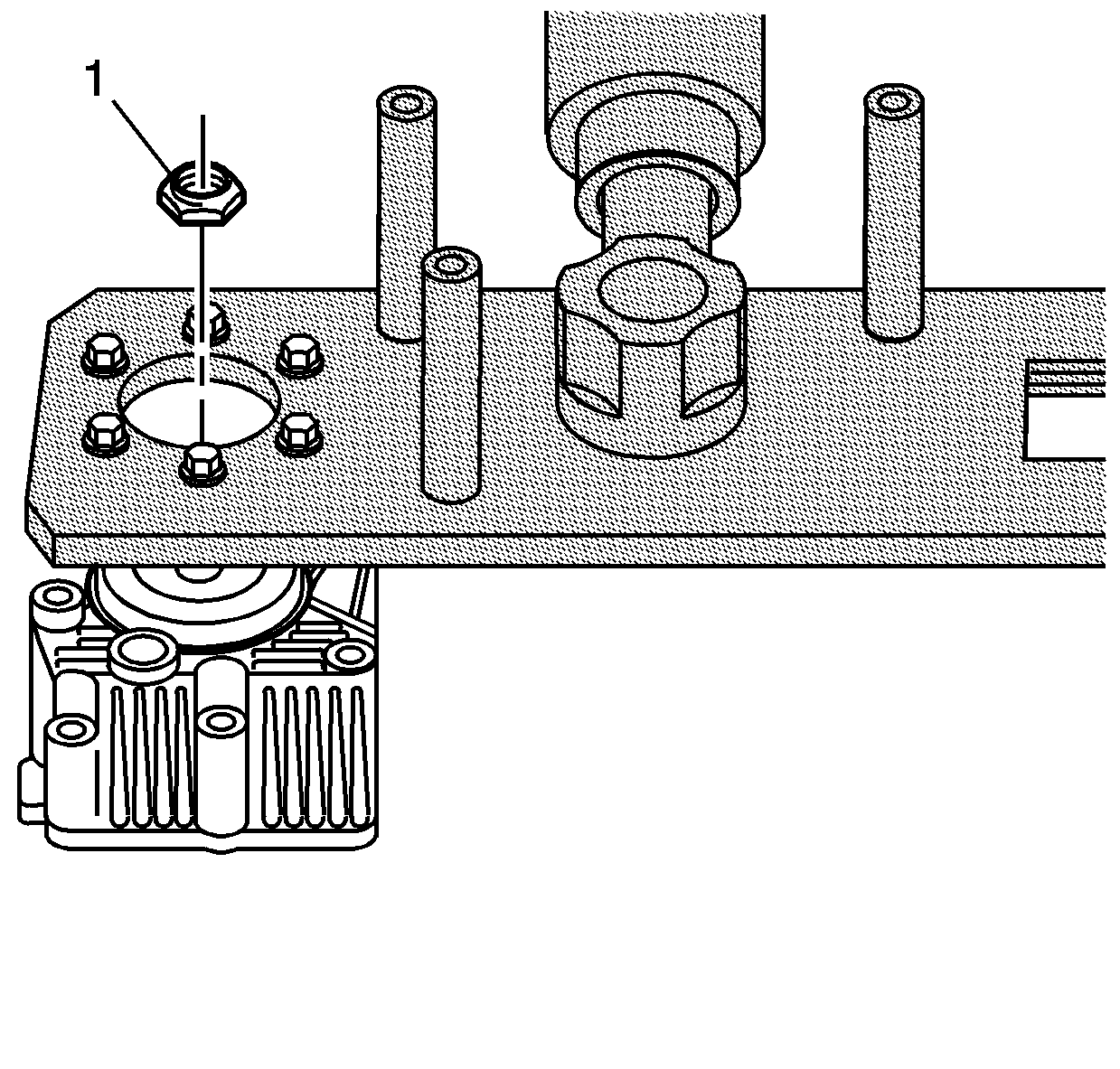
Tighten
| • | Tighten the nut, with new bearings to 250 N·m (185 lb ft). |
| • | Tighten the nut, with used bearings to 200 N·m (148 lb ft). |
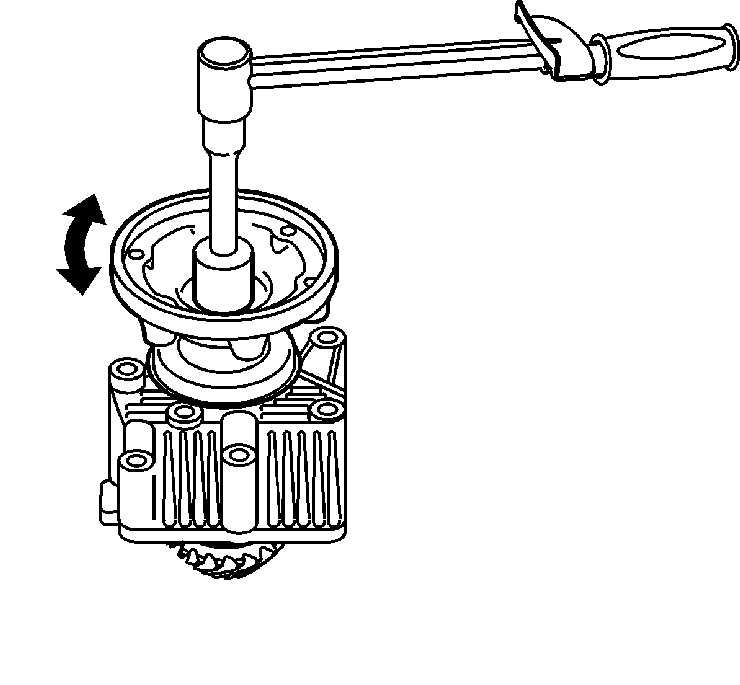
Important: Loosening the pinion nut to achieve proper rotating torque requires replacement with a new spacer.
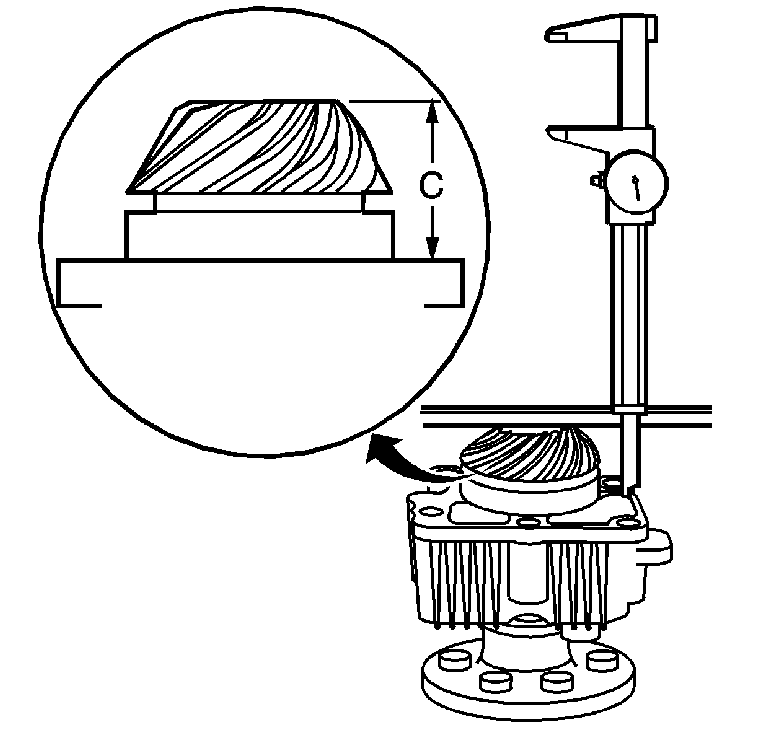
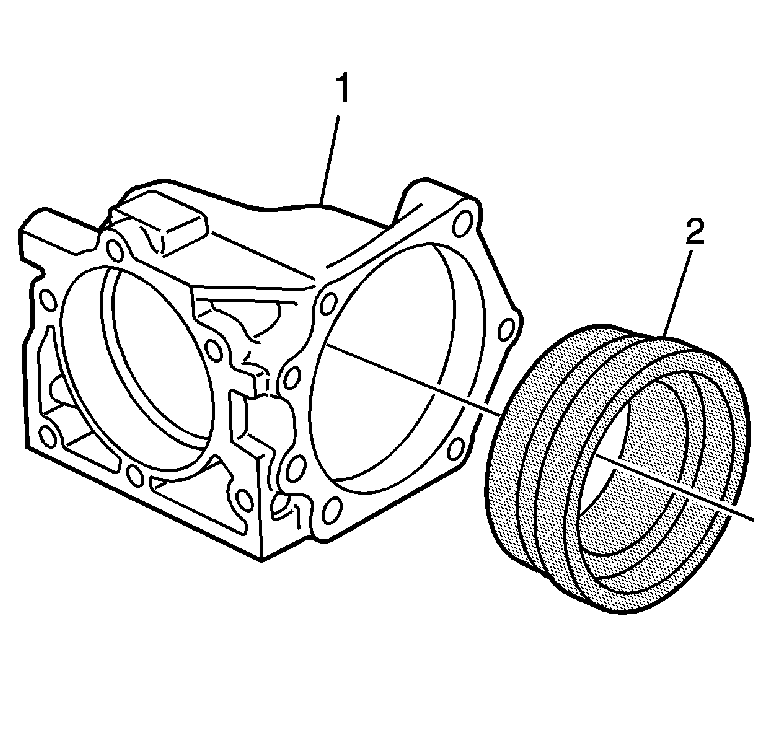
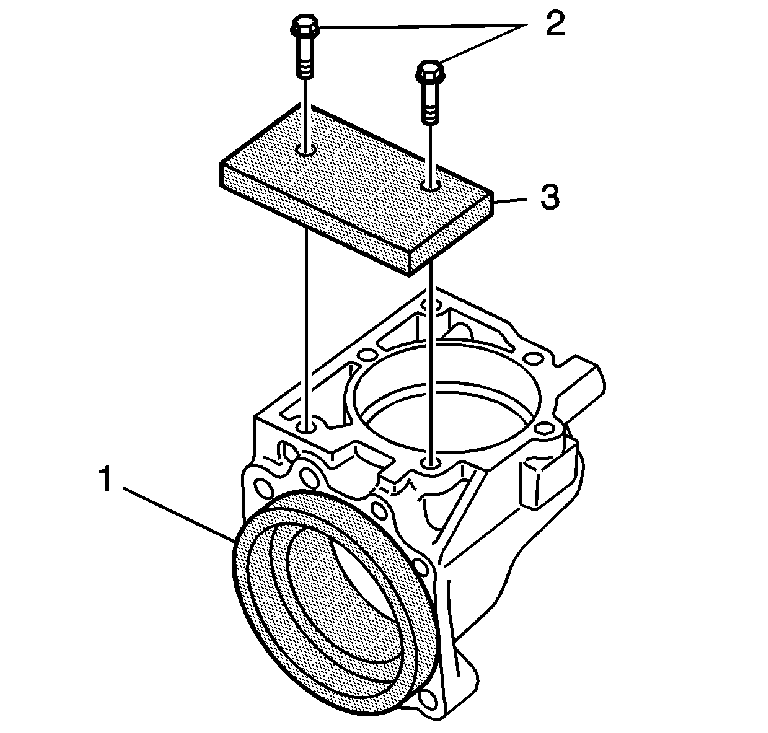
Tighten
Tighten the bolts to 25 N·m (18 lb ft).
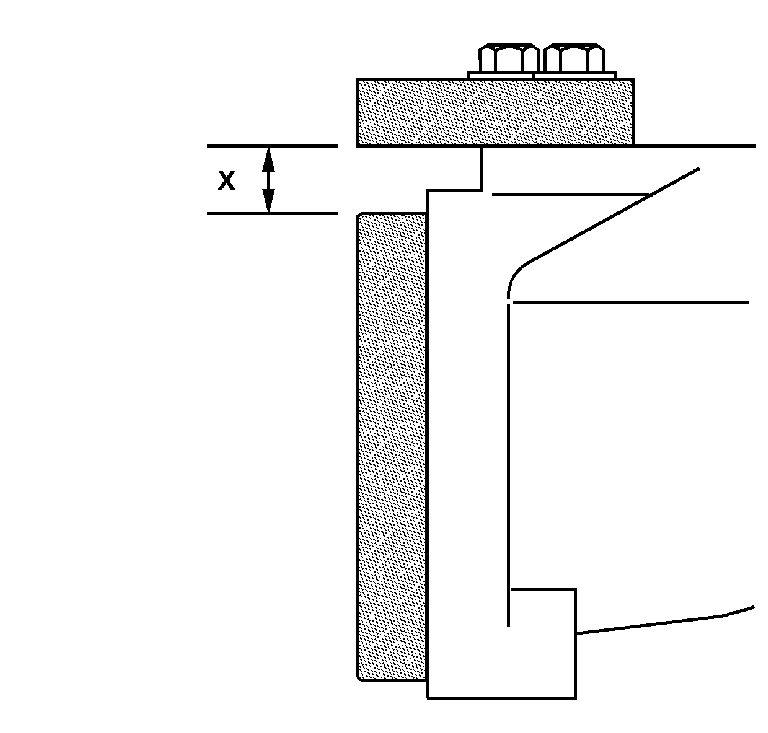
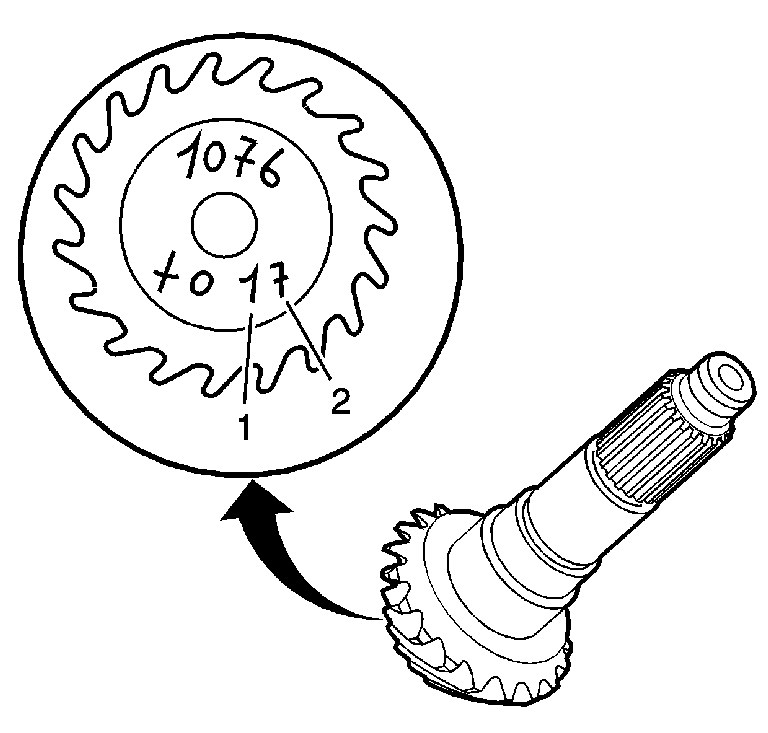
Note that the handwritten 1 (1) and 7 (2) are similar. The 7 (2) will have a line drawn through the number. A comma is to be considered a decimal point.
Extension Housing Assembly and Shim Selection - Procedure B
- Use the J 44908 (1) and a hydraulic press in order to install the outer bearing race to the extension housing.
- Use the J 44908 (1) and a hydraulic press in order to install the inner bearing race to the extension housing.
- Use the J 44907 (1) and a hydraulic press in order to install the inner bearing (2) to the driven shaft.
- Install the driven shaft (3) and NEW spacer (1) into the extension housing (2).
- Use the J 5590 (1) and a hydraulic press in order to install the bearing onto the shaft.
- Use the J 36797-A (1) in order to install a new oil seal (2) into the extension housing (3).
- Lightly lubricate the splines of the driven shaft with grease.
- Install the flange (1) onto the shaft using a hydraulic press.
- Install the extension housing assembly (3) and bolts (1) to the J 44755 (2).
- Install a new nut (1) onto the shaft.
- Remove the extension housing assembly and bolts from the J 44755 .
- Measure in both directions, the rotating torque of the driven shaft. A properly assembled shaft and NEW bearings should have a rotating torque of 1.5 N·m (13 lb in). When reusing driven shaft bearings, the rotating torque should equal the value recorded during disassembly. Tighten the flange nut as required to achieve the proper rotating torque value.
- Measure the distance between the end of the pinion and the extension housing seal surface. Record the value as dimension C.
- Determine the 4 digit value (1) on the end of the driven shaft gear.
- Install the J 44757-3 (2) into the bore of the housing (1).
- Install J 44757-9 (3) and bolts (2) to the housing (1).
- Measure the distance (x) between the J 44757-3 and the J 44757-9 using a feeler gage. Add the measured value (x) to 67.3 mm (2.65 in). Record the value as dimension D.
- Calculate the extension housing shim thickness. Refer to Extension Housing Shim Calculation Table - Procedure B in General Specifications .








Notice: Use the correct fastener in the correct location. Replacement fasteners must be the correct part number for that application. Fasteners requiring replacement or fasteners requiring the use of thread locking compound or sealant are identified in the service procedure. Do not use paints, lubricants, or corrosion inhibitors on fasteners or fastener joint surfaces unless specified. These coatings affect fastener torque and joint clamping force and may damage the fastener. Use the correct tightening sequence and specifications when installing fasteners in order to avoid damage to parts and systems.
Tighten
Tighten the bolts to 25 N·m (18 lb ft).

Tighten
| • | Tighten the nut, with new bearings to 250 N·m (185 lb ft). |
| • | Tighten the nut, with used bearings to 200 N·m (148 lb ft). |



A comma is to be considered a decimal point. Record the value as dimension E.


Tighten
Tighten the bolts to 25 N·m (18 lb ft).

Gears and Cases Assembly
- Use the J 5590 (1) and a hydraulic press in order to install the bearings onto the idler gear.
- Use the J 44752 (1) and a hydraulic press in order to install the bearing race into the left cover.
- Install the idler gear (2) and bearing race (1) to the left case.
- Inspect the gear for proper installation. The side of the gear with the long flange area (1) should be installed to the right case side.
- Install the J 44757-1 (1) to the idler gear and race.
- Install the right cover (1), bolts (2), and J 44757-8 (3) to the left case.
- Using a feeler gage, measure the gap (1) in the J 44757-1 . The measured amount is the idler gear bearing shim thickness.
- Disassemble the right case and tools from the left case.
- Install the selected idler gear bearing shim (2) and bearing race (1) to the right case.
- Use the J 44752 (1) and a hydraulic press in order to install the bearing race to the right case.
- Install the driveshaft bearing (3) to the right case.
- Use the J 44753 (1) and a hydraulic press in order to install the bearing to the right case.
- Use the J 44753 (1) to install the transaxle side oil seal (2) to the left case. Install until the seal bottoms in the left case bore.
- Use the J 44753 (1) to install the oil seal-gear oil side (2) to the left case. Install until the tool bottoms against the left case.
- Use the J 44908 (1) and a hydraulic press in order to install the outer bearing race to the left case.
- Use the J 44908 (1) and a hydraulic press in order to install the inner bearing race to the left case.
- Use the J 44907 (1) and a hydraulic press in order to install the inner bearing (2) to the driveshaft.
- Assemble the shaft (1), J 44757-7 shim (2), and bearing (3) to the left case.
- Use the J 5590 (1) and a hydraulic press in order to install the shaft, J 44757-7 shim, race, and bearing to the left case.
- Install the J 44757-2 (5) onto the driveshaft. Tighten until snug.
- Install the J 44757-6 (4), J 44757-8 (1), bolts (2), and nuts and washers (3) to the left case.
- Rotate the driveshaft, multiple times in both directions to ensure the bearing rollers are seated to the bearing races.
- Install J 8001 (3) onto the J 44757-6. Position the tip (2) of the indicator onto the end of the J 44757-2.
- Tighten the nut (4) of the J 44757-2 to preload to the bearings and position the shaft at the bottom of travel. Use a second wrench to hold the J 44757-2 shaft. Observe the needle on the dial. When the needle movement stops, the shaft is at bottom of travel.
- Zero the dial indicator.
- Loosen and back-off the nut (4).
- Tighten the nut (1) to preload the bearings and position the shaft at the top of travel. Use a second wrench to hold the J 44757-2 shaft.
- Record the measured value on the dial indicator. Subtract the measured value from 6.0 mm (0.236 in) in order to determine the driveshaft shim required for proper bearing installation and preload.
- Disassemble the shaft (1), bearing (3), and J 44757-7 shim (2) from the left case.
- Install the proper size shim (2), shaft (1), bearing (3).
- Lightly lubricate the splines of the driveshaft with grease.
- Use the J 5590 (1) and a hydraulic press in order to install the bearing, proper size shim, and gear (2) onto the shaft.
- Install the left case (2) onto the J 44755 (1). Align the notched area of the tool with the flat areas of the driveshaft.
- Install a new nut (1) onto the driveshaft.
- Measure the rotating torque of the driveshaft. A properly assembled shaft and bearings should have a rotating torque of 1.5 N·m (13 lb in).
- Use the J 44752 (1) and a hydraulic press in order to install the carrier bearing inner race to the right case.
- Use the J 44752 (1) and a hydraulic press in order to install the carrier bearing outer race to the right case.
- Use the J 44752 (1) and a hydraulic press in order to install the inner bearing to the differential carrier.
- Install the carrier (4), J 44757-4 shim (3), and bearing (1) to the right case (2).
- Use the J 44752 (1) and a hydraulic press in order to install the carrier, J 44757-4 shim, and bearing to the right case.
- Install the right case (1) onto the J 44755 (2). Position the carrier onto the post of the fixture.
- Install the J 44757-5 (5) onto the carrier. Tighten until snug.
- Install the J 44757-6 (4), J 44757-8 (1), bolts (2), nuts and washers (3), and nuts (6) to the right case.
- Rotate the differential carrier multiple times in both directions to ensure the bearing rollers are seated to the bearing races.
- Install J 8001 (3) onto the J 44757-6. Position the tip (2) of the indicator onto the end of the J 44757-5.
- Tighten the nut (4) of the J 44757-5 to preload to the bearings and position the differential carrier at the bottom of travel. Use a second wrench to hold the J 44757-5 shaft. Observe the needle on the dial. When the needle movement stops, the carrier is at bottom of travel.
- Zero the dial indicator.
- Loosen and back-off the nut (4).
- Tighten the nut (1) to preload the bearings and position the carrier at the top of travel. Use a second wrench to hold the J 44757-5 shaft.
- Record the measured value on the dial indicator. Subtract the measured value from 10 mm (0.394 in) in order to determine the carrier shim required for proper bearing installation and preload.
- Disassemble the carrier (4), bearing (1), and J 44757-4 shim (3) from the right case (2).
- Install the proper size shim (3), carrier (4), and bearing (1) to the right case (2).
- Use the J 44752 (1) and a hydraulic press in order to install the shaft, proper size shim, and bearing to the right case.
- Install the nut (1) to the differential carrier.
- Measure the rotating torque of the carrier. A properly assembled carrier and bearings should have a rotating torque of 1.5 N·m (13 lb in).
- Using a punch, stake the flange of the nut to the groove in the carrier shaft.
- Use the J 44752 (1) in order to install the seal (2) to the right case.
- Remove the right case (1) and carrier from the J 44755 (2).
- Install a random size shim (3), housing (2), and bolts (1 and 4) to the left case.
- Apply pipe thread sealant GM P/N 12346004 (Canadian P/N 10953480), or equivalent, to both sides of the shim (2).
- Install the housing (1), selected shim (2), and bolts (3) to the housing.
- Install an M8 x 1.25 bolt (1) into a threaded hole in the flange.
- Position the top of J 8001 (2) against the flat area of the bolt.
- Install a wrench or socket onto the nut (1) of the driveshaft. Do not allow the shaft to rotate or move when measuring backlash.
- Rotate the flange (2) left and right in order to measure the drive and driven shafts gear backlash. Measure the backlash in multiple locations. The correct gear backlash is 0.2-0.3 mm (0.0078-0.0118 in).
- Select and install the correct shim (4) to obtain the proper backlash. A change in shim thickness has a one-to-one ratio and change in gear backlash.
- Install a new O-ring (5) during final assembly.
- Apply pipe thread sealant GM P/N 12346004 (Canadian P/N 10953480), or equivalent, to the sealing surfaces of the right case.
- Install the idler gear (1) to the right case.
- Install the idler gear into the right case. The side of the gear with the long flange area (1) should be installed to the right case.
- Rotate the J 44755 90 degrees.
- Install the right case (2) to the left case (1).
- Install the bolts (1) and tighten as follows:
- Install the speed sensor (1) and O-ring.
- Install the hose and clamp (1), vent hose (2), and bolt (3).
- Install the transmission oil drain plug (1) and gasket.
- Install the gear oil drain plug (1) and gasket.
- Perform the transfer case selective washer measurement procedure, as required. Refer to Transmission to Transfer Case End Play Check in Transmission Unit Repair 4T65-E.
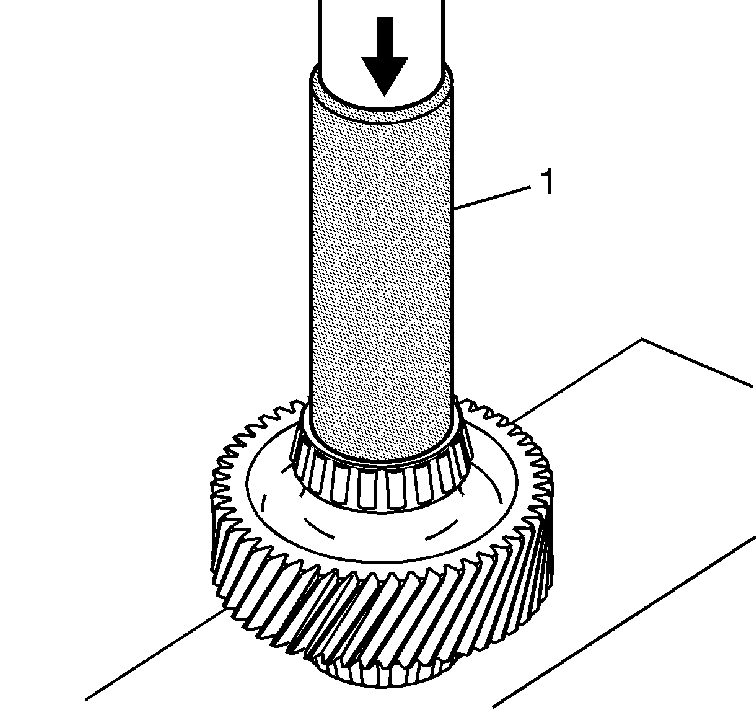
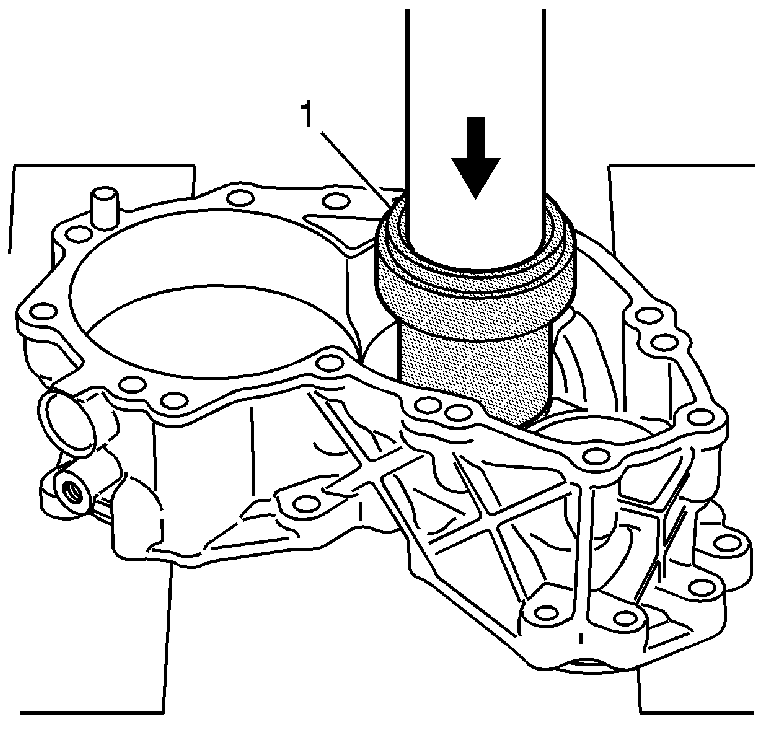
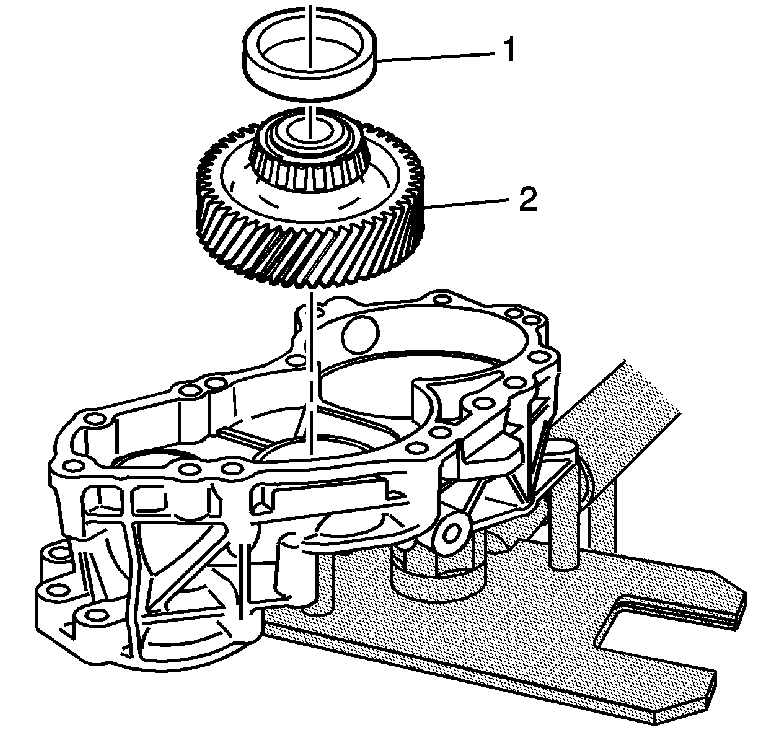
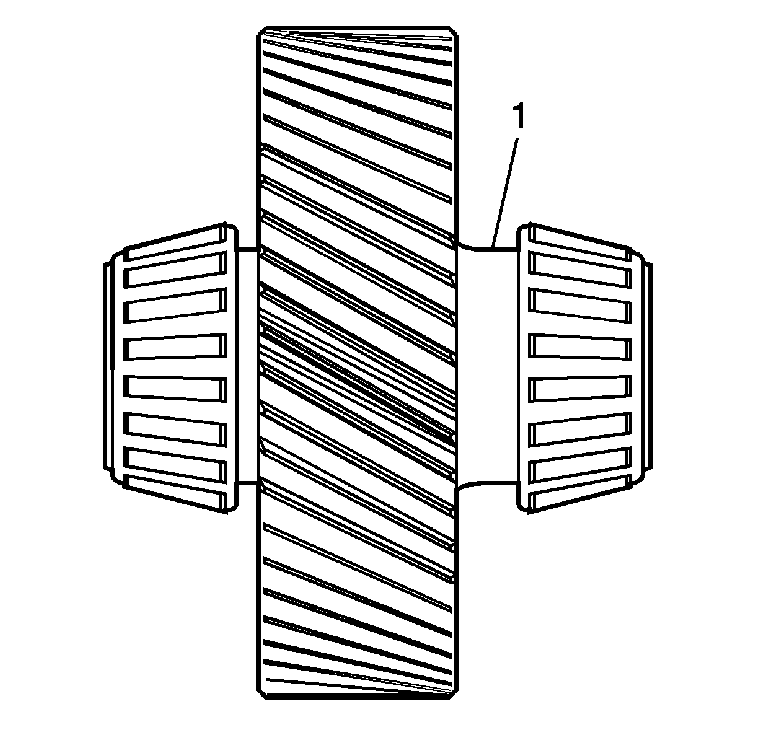
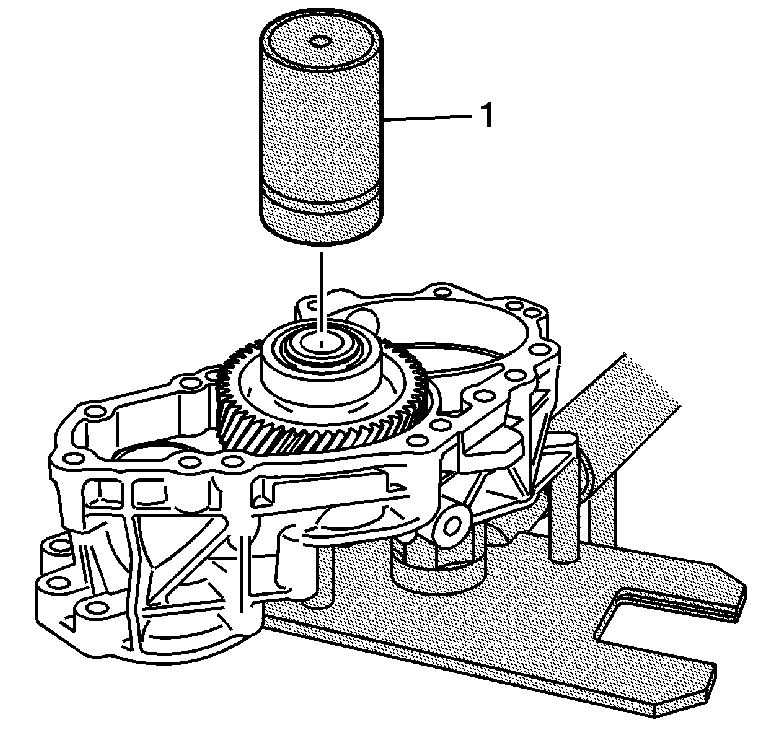
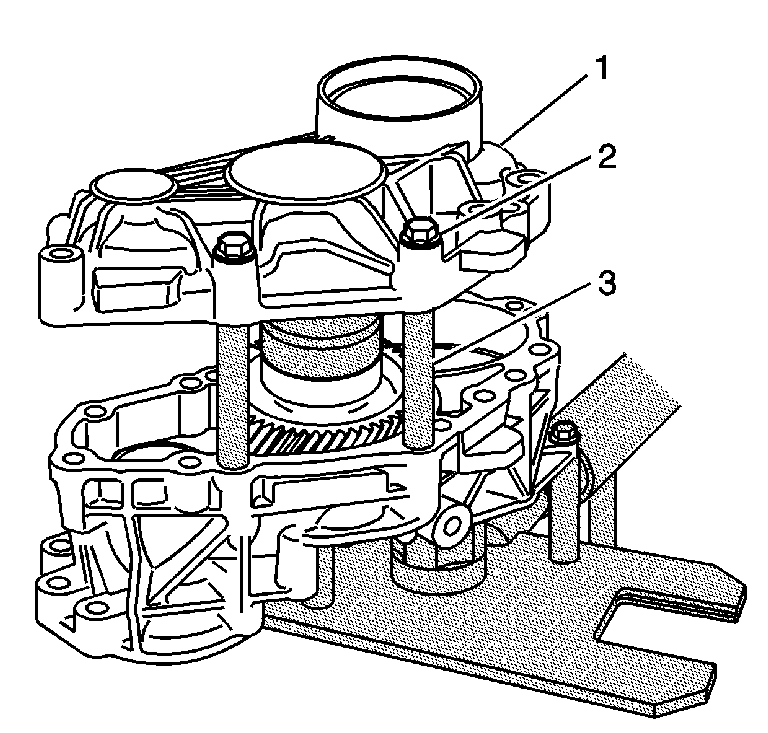
Tighten
Tighten the bolts to 25 N·m (18 lb ft).
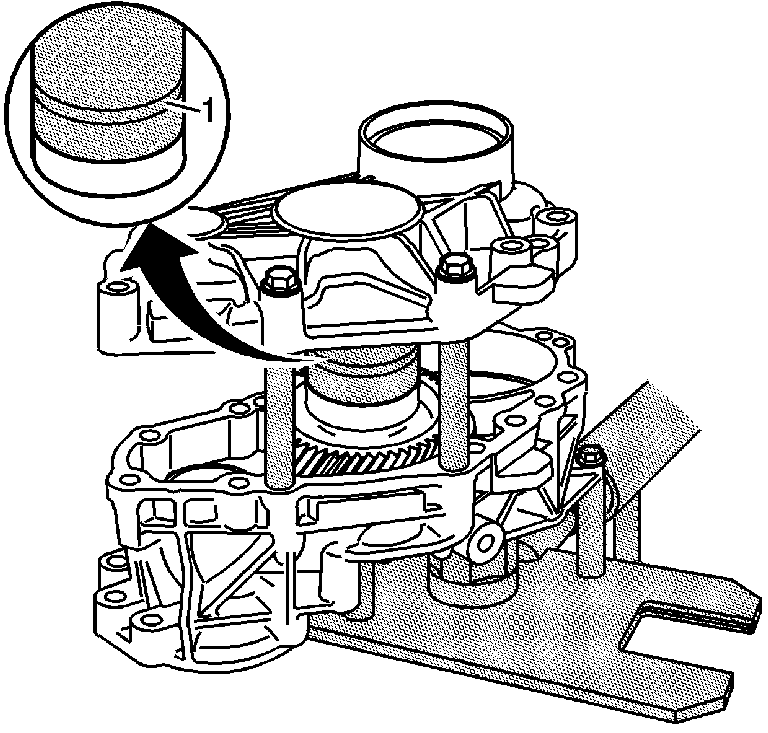
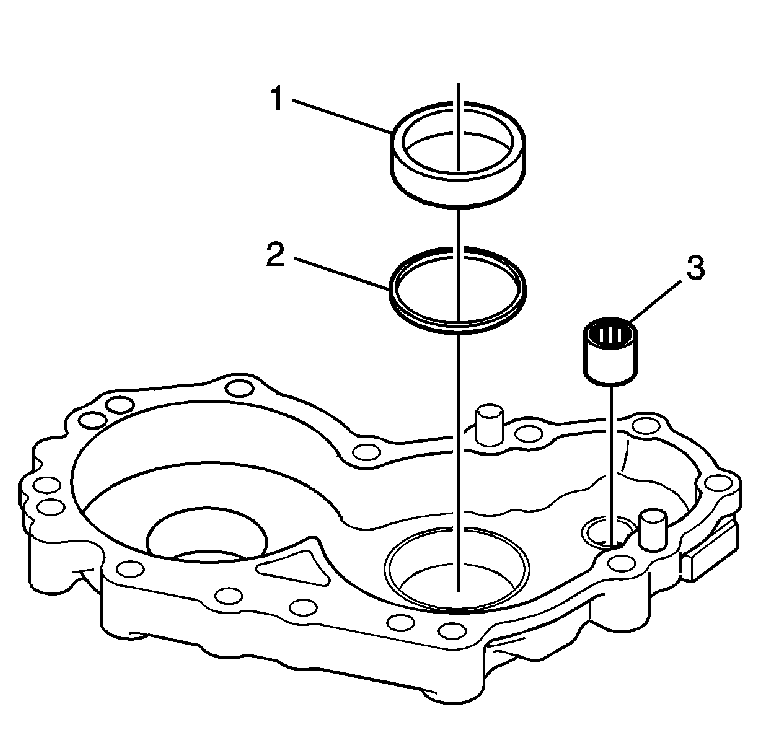
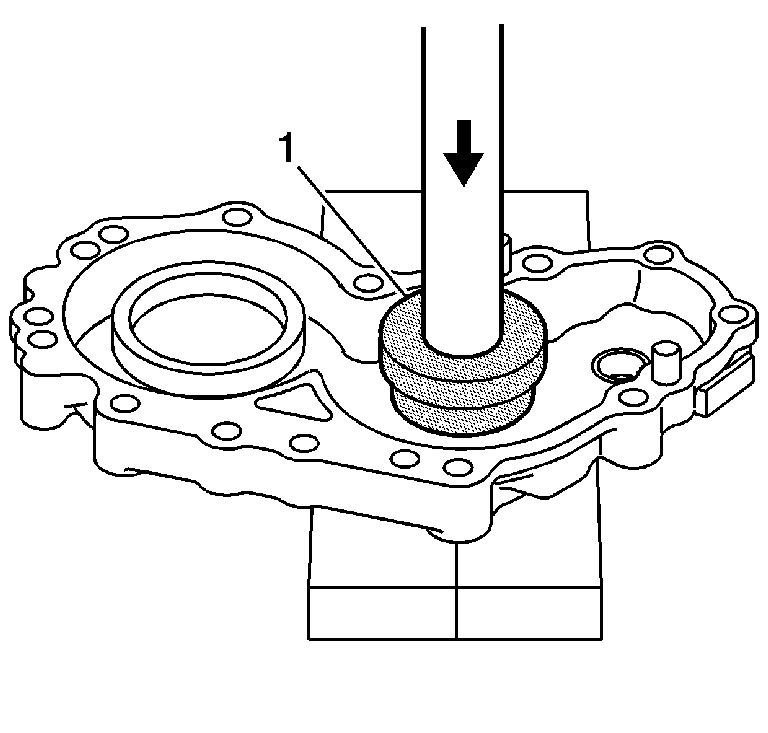

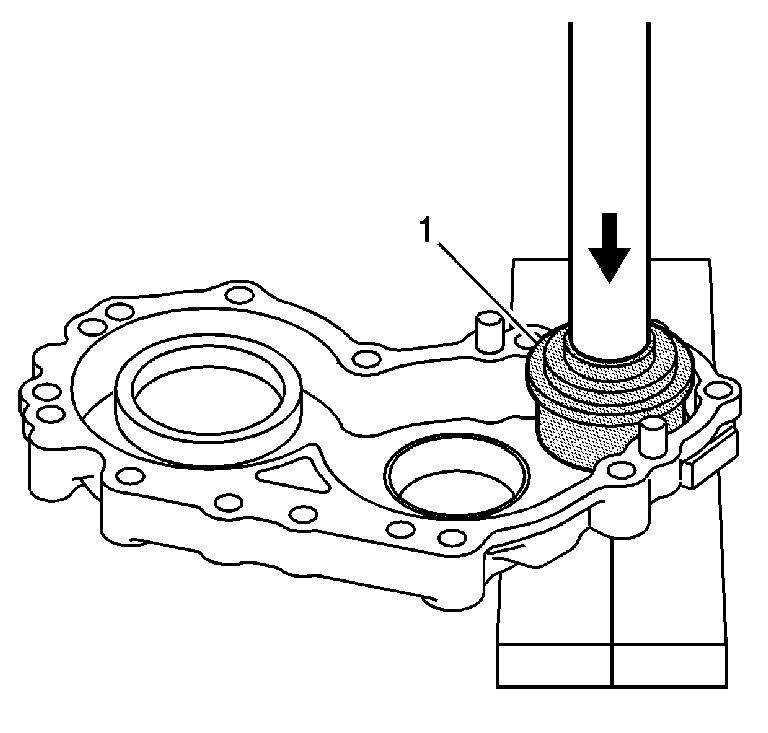
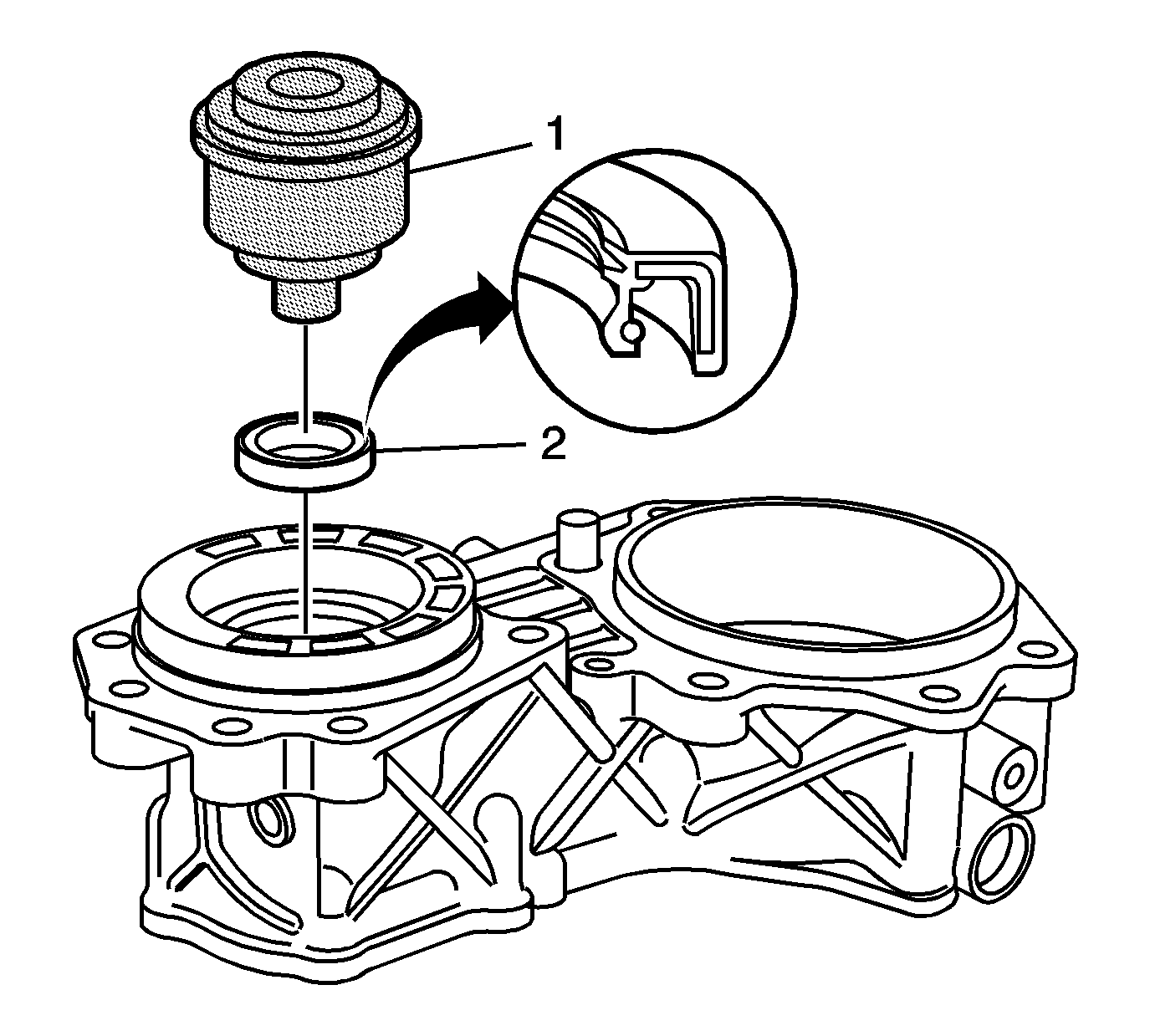
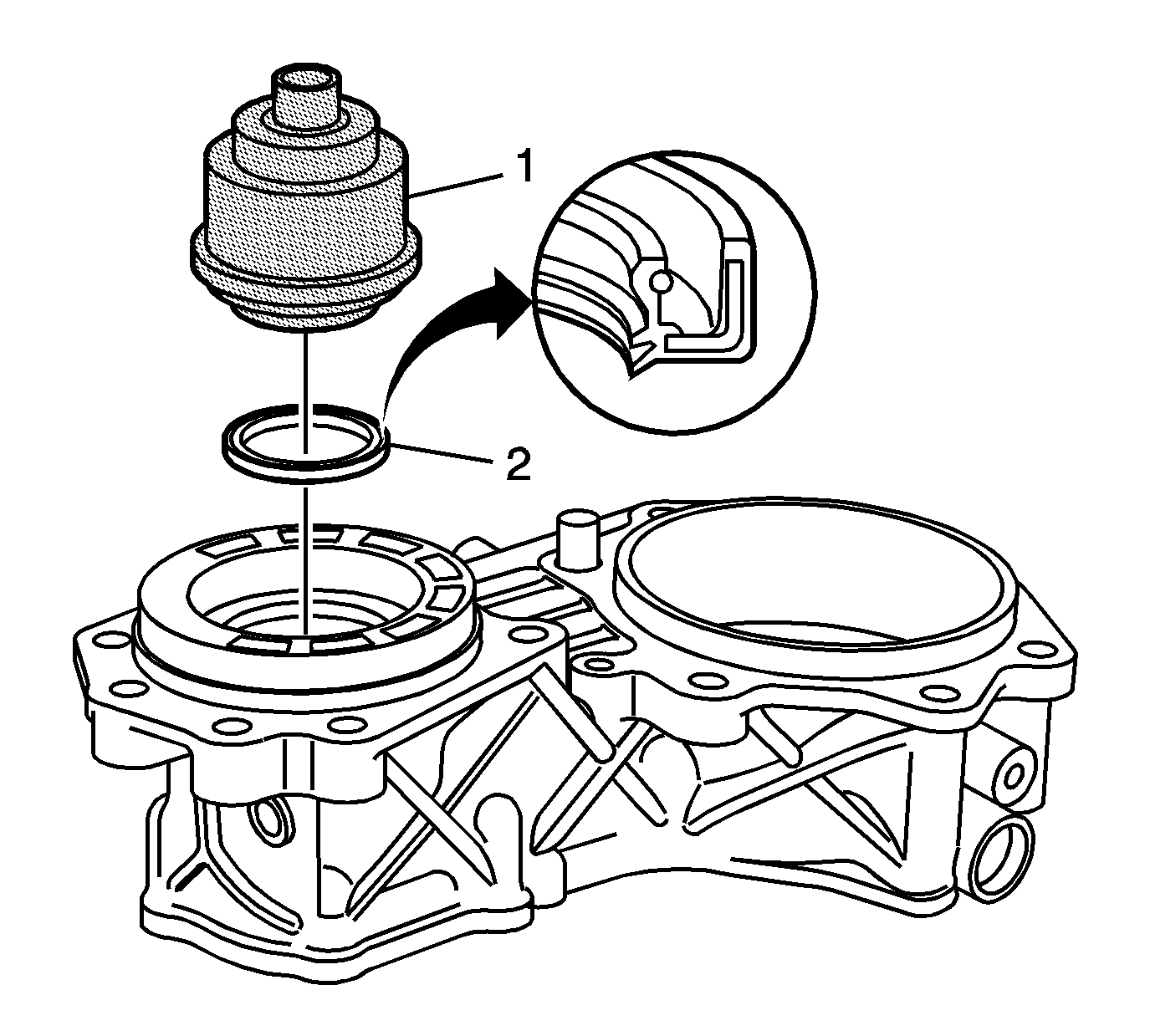
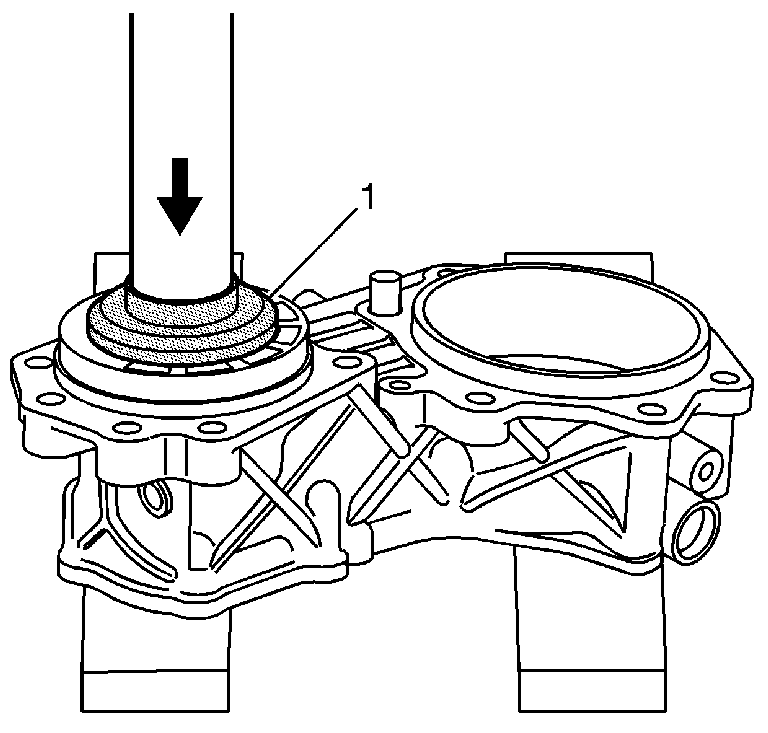
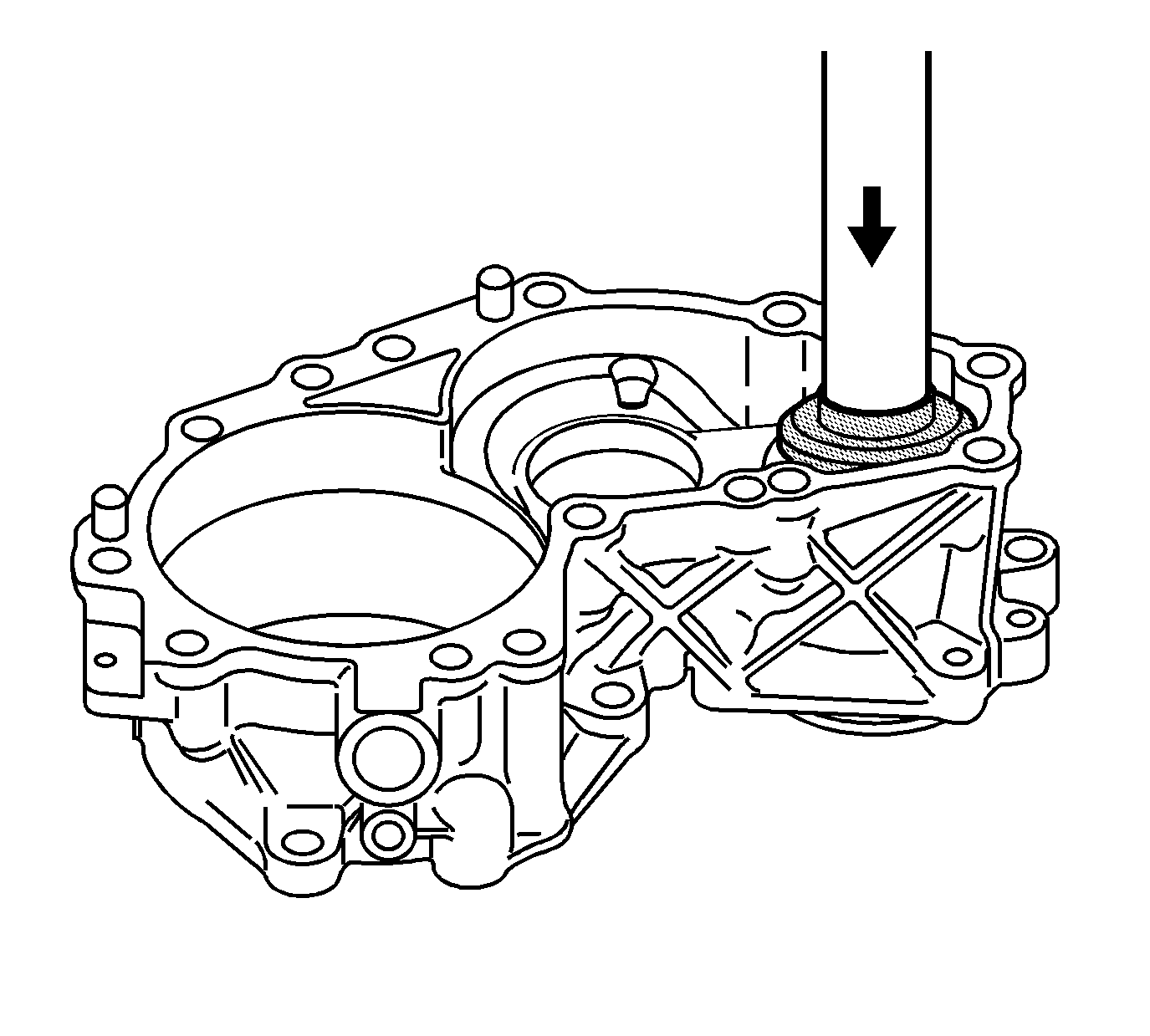

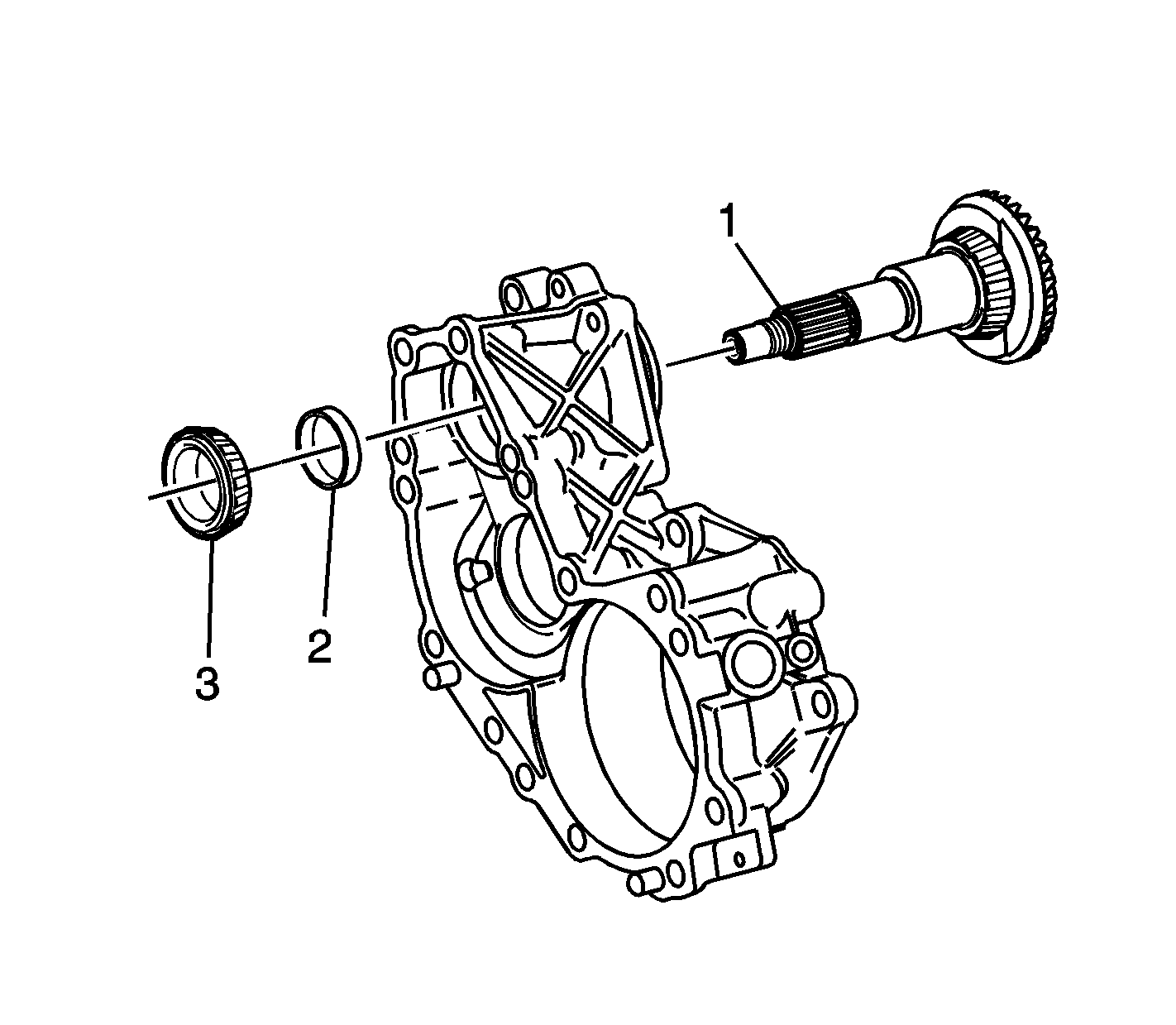
Important: The J 44757-7 shim is installed to create measurable end play and to assist in determining the proper size shim for bearing preload.
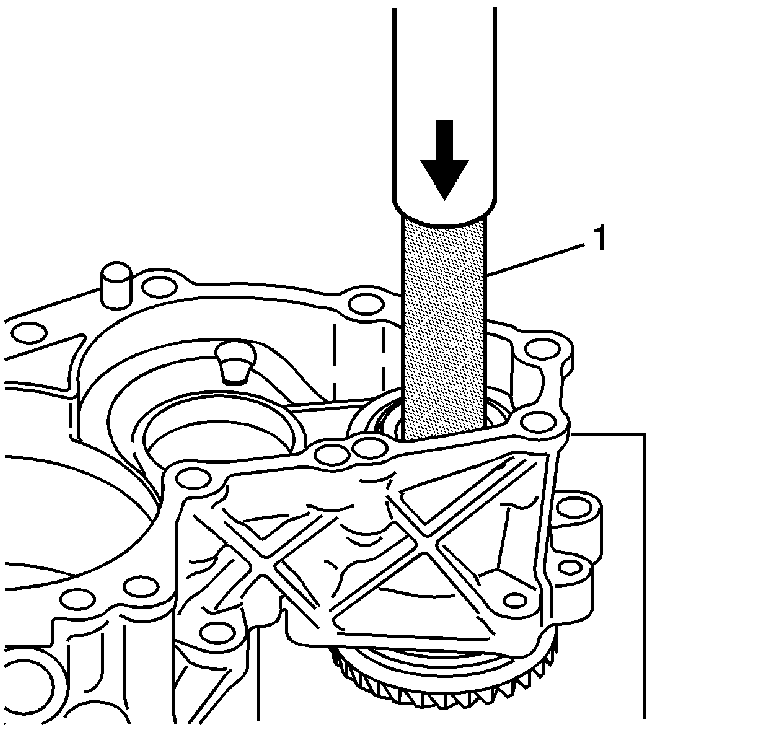
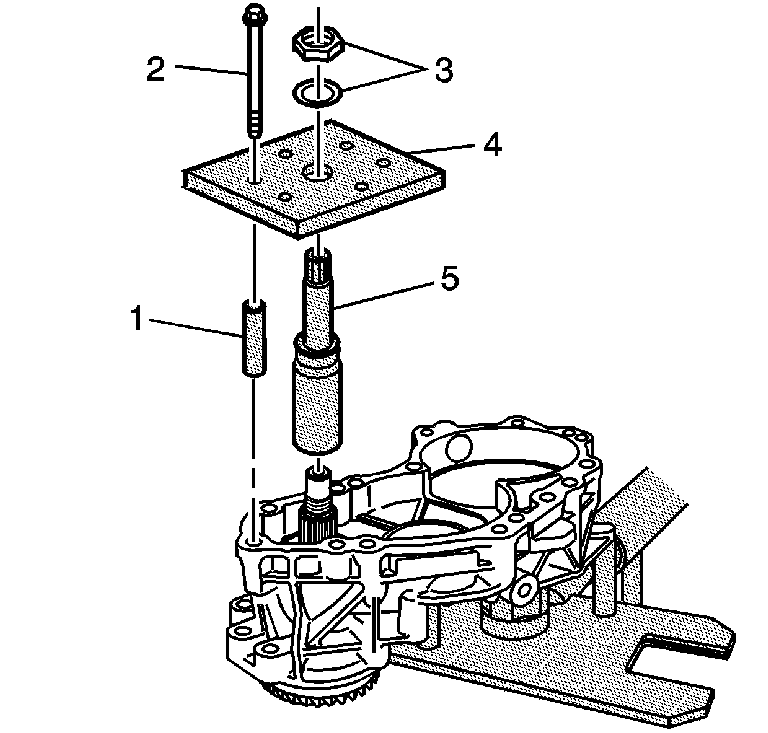
Tighten
Tighten the bolts to 25 N·m (18 lb ft).
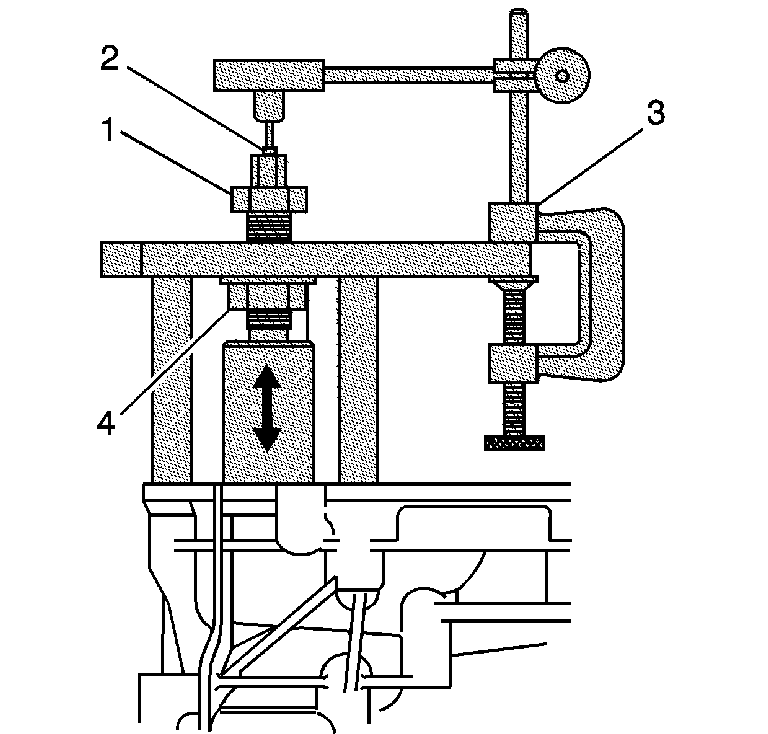

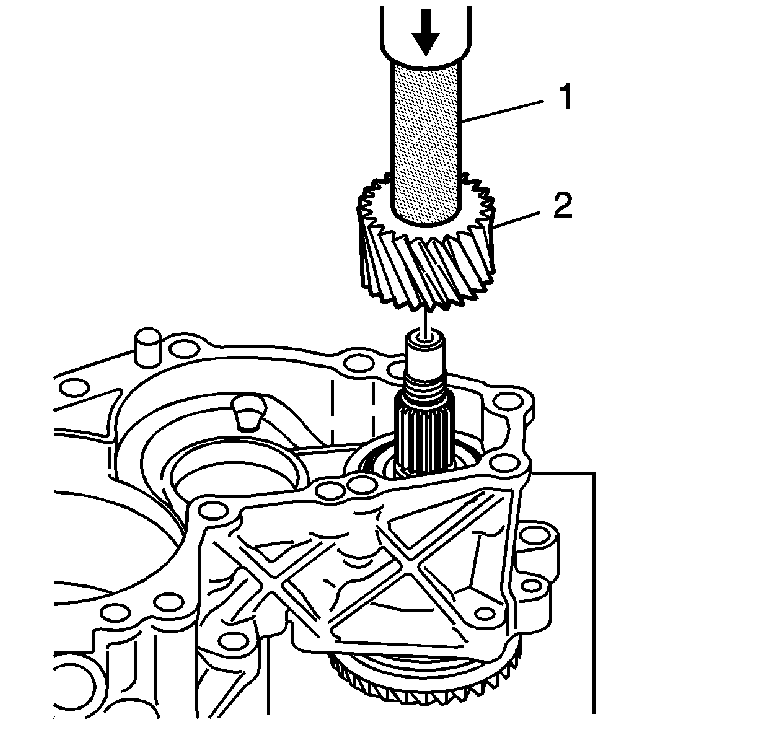
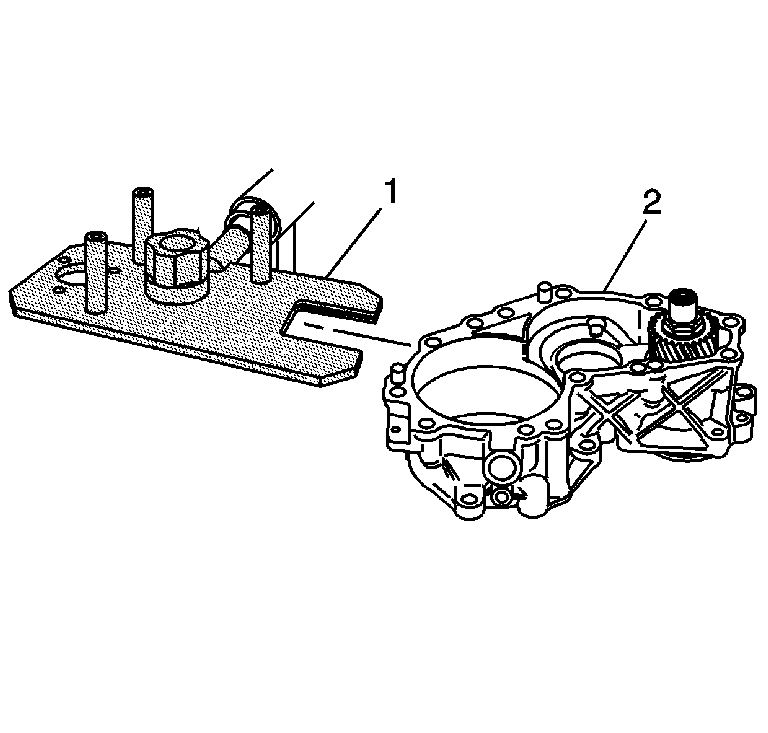
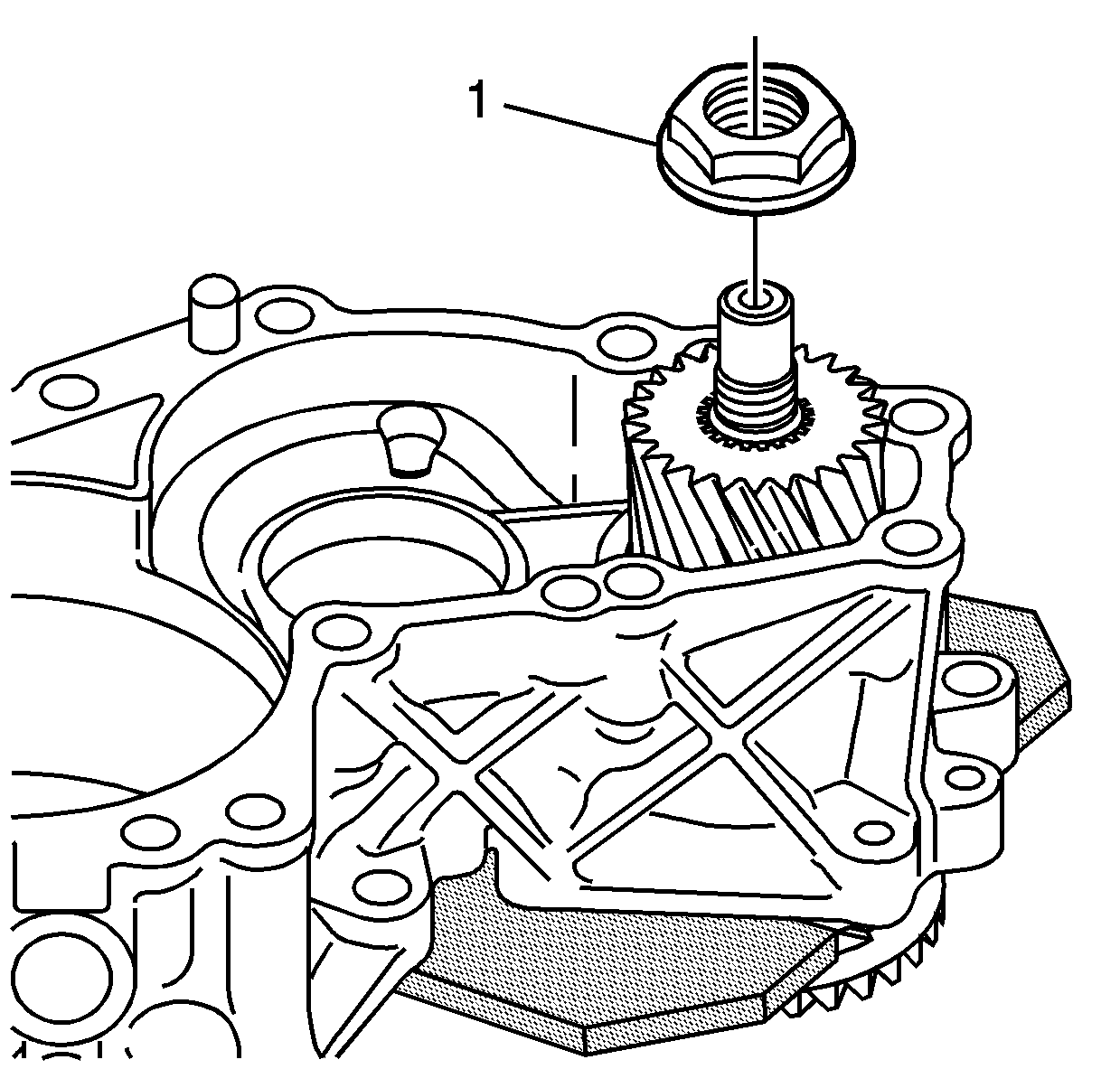
Tighten
Tighten the nut to 505 N·m (372 lb ft).
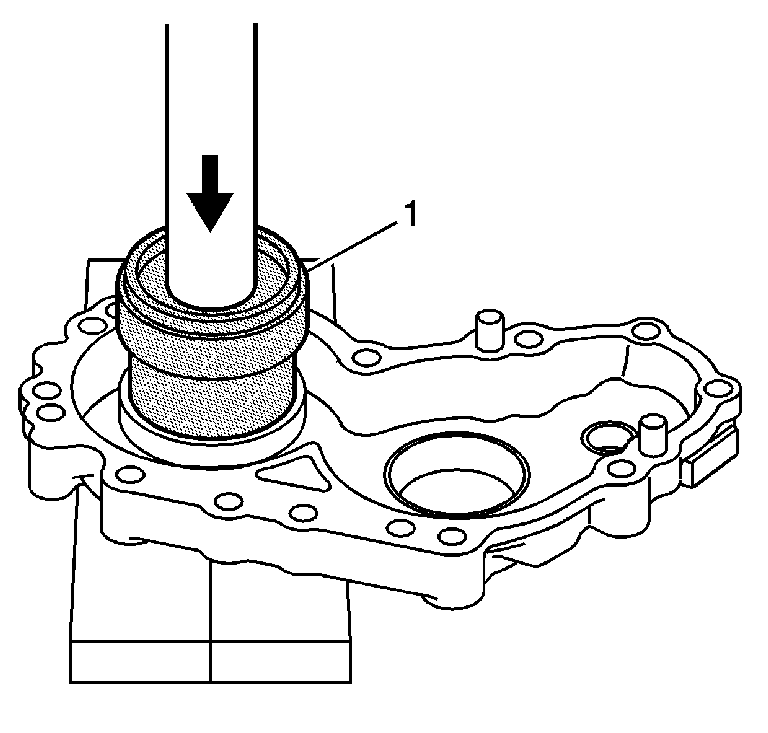
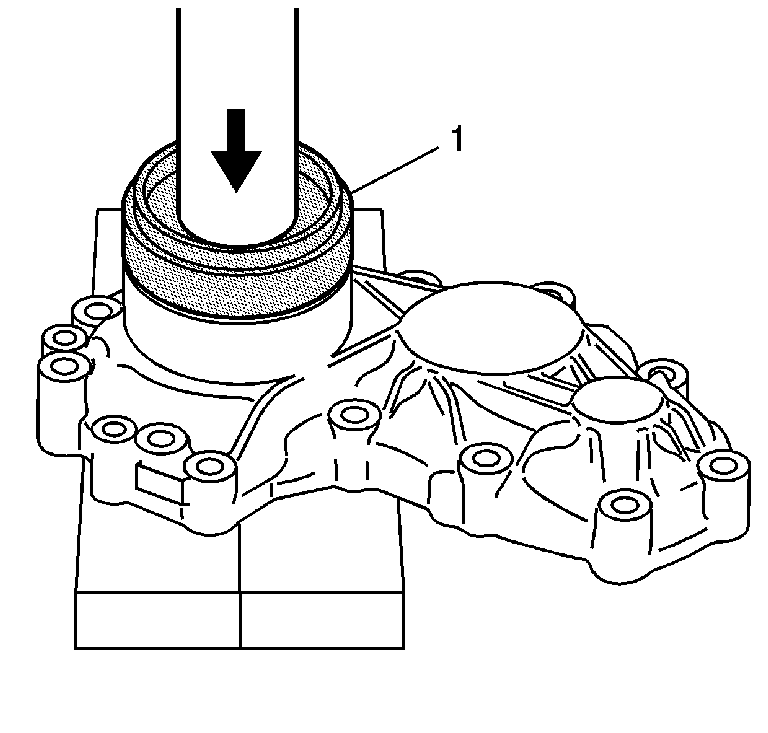
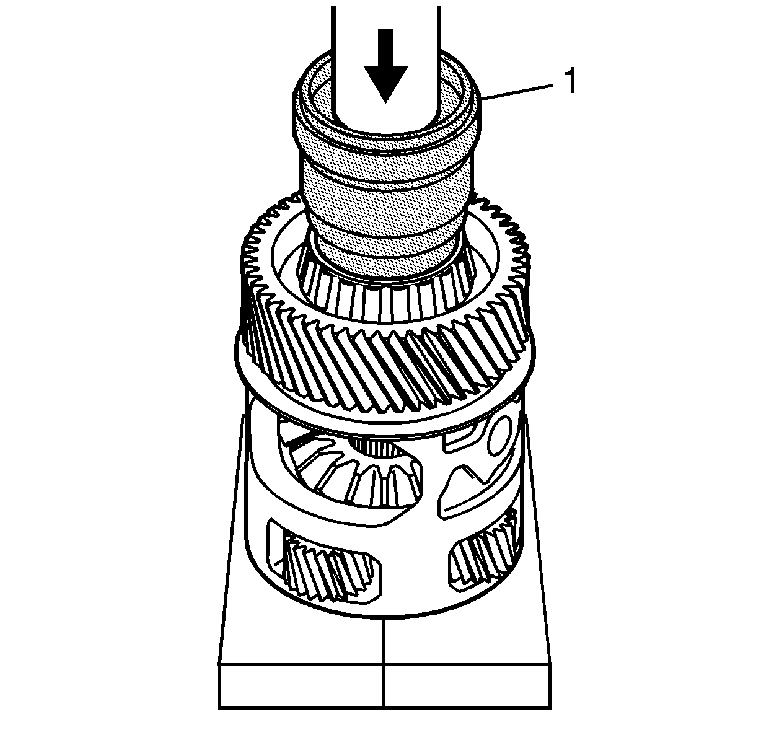
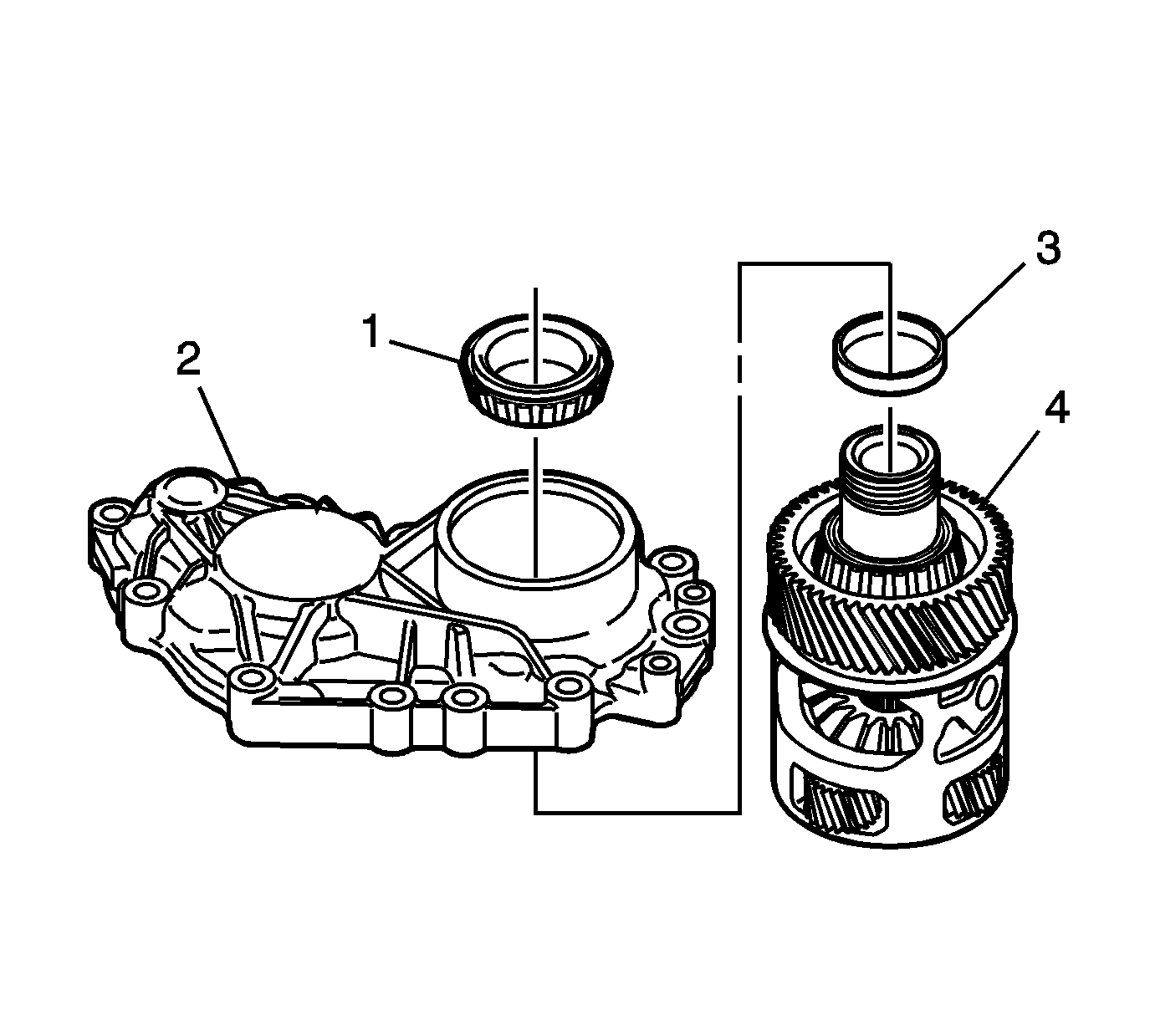
Important: The J 44757-4 shim is installed to create measurable end play and assist in determining the proper size shim for bearing preload.
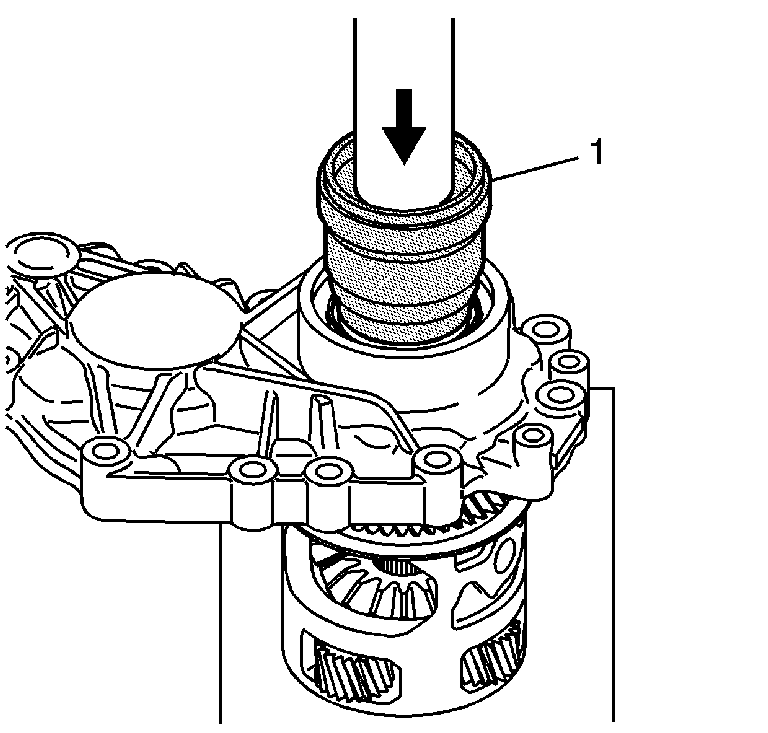
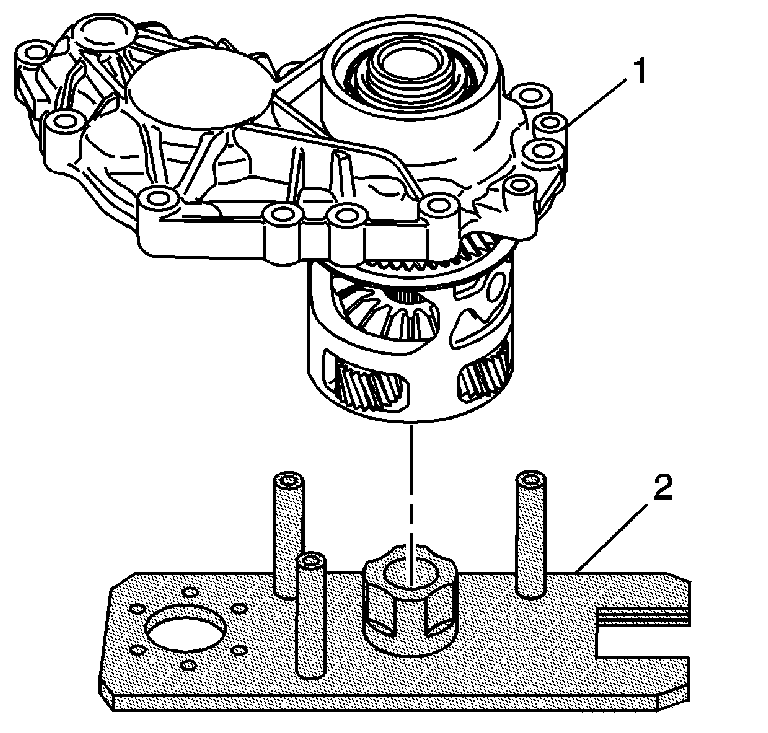
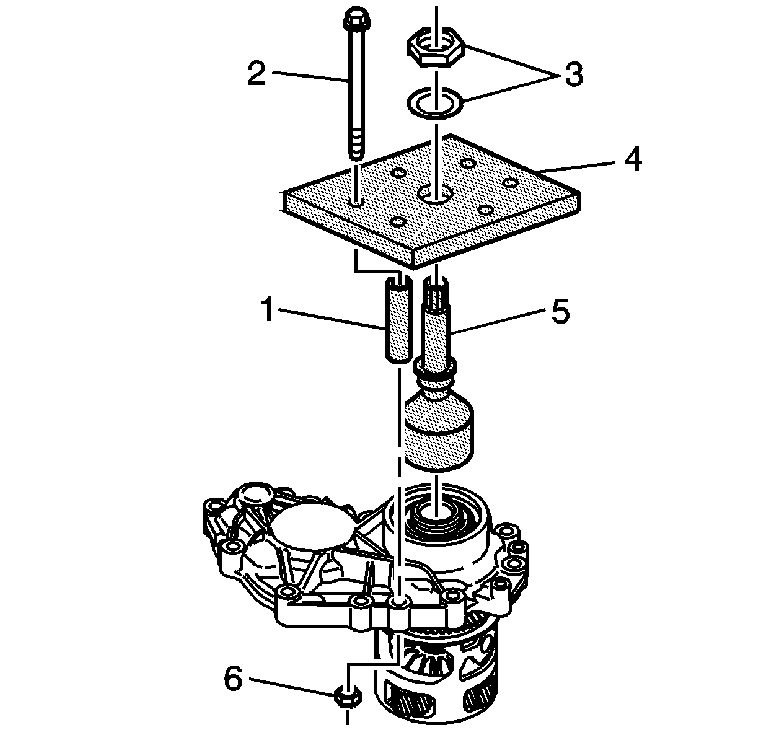
Tighten
Tighten the bolts to 25 N·m (18 lb ft).



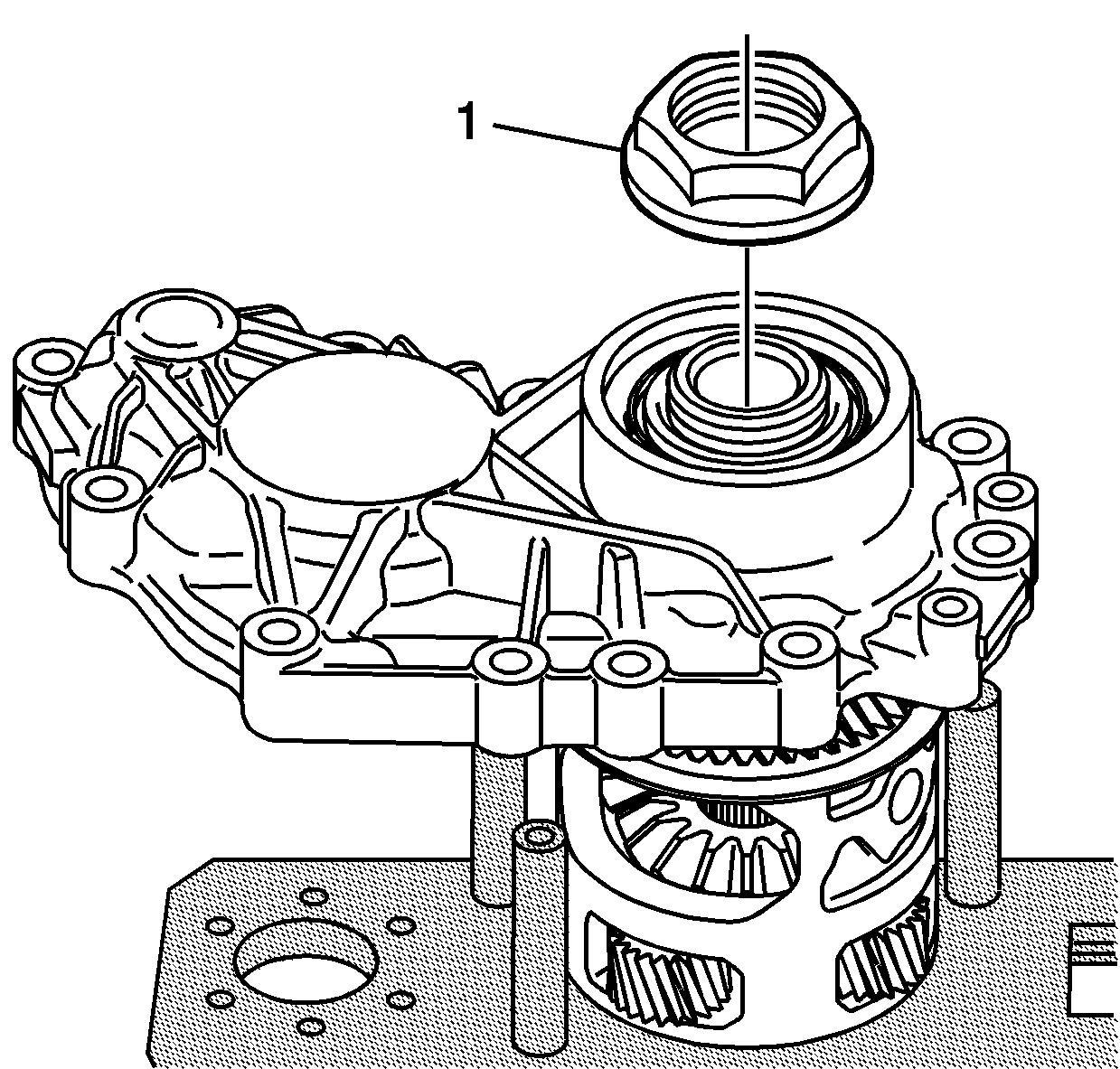
Tighten
Tighten the nut to 500 N·m (369 lb ft).
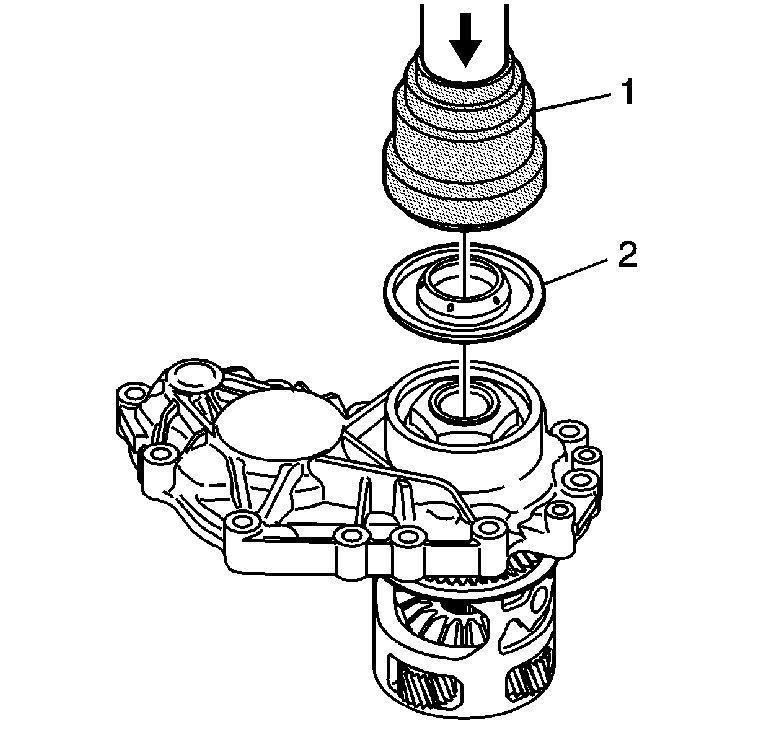

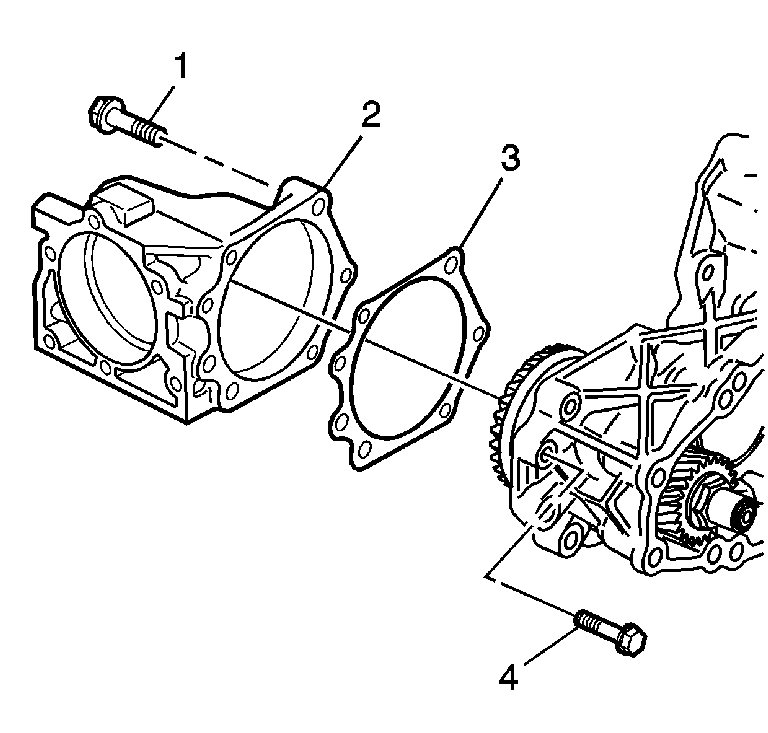
Tighten
| • | Tighten the M8 bolts to 32 N·m (23 lb ft). |
| • | Tighten the M10 bolts to 60 N·m (44 lb ft). |
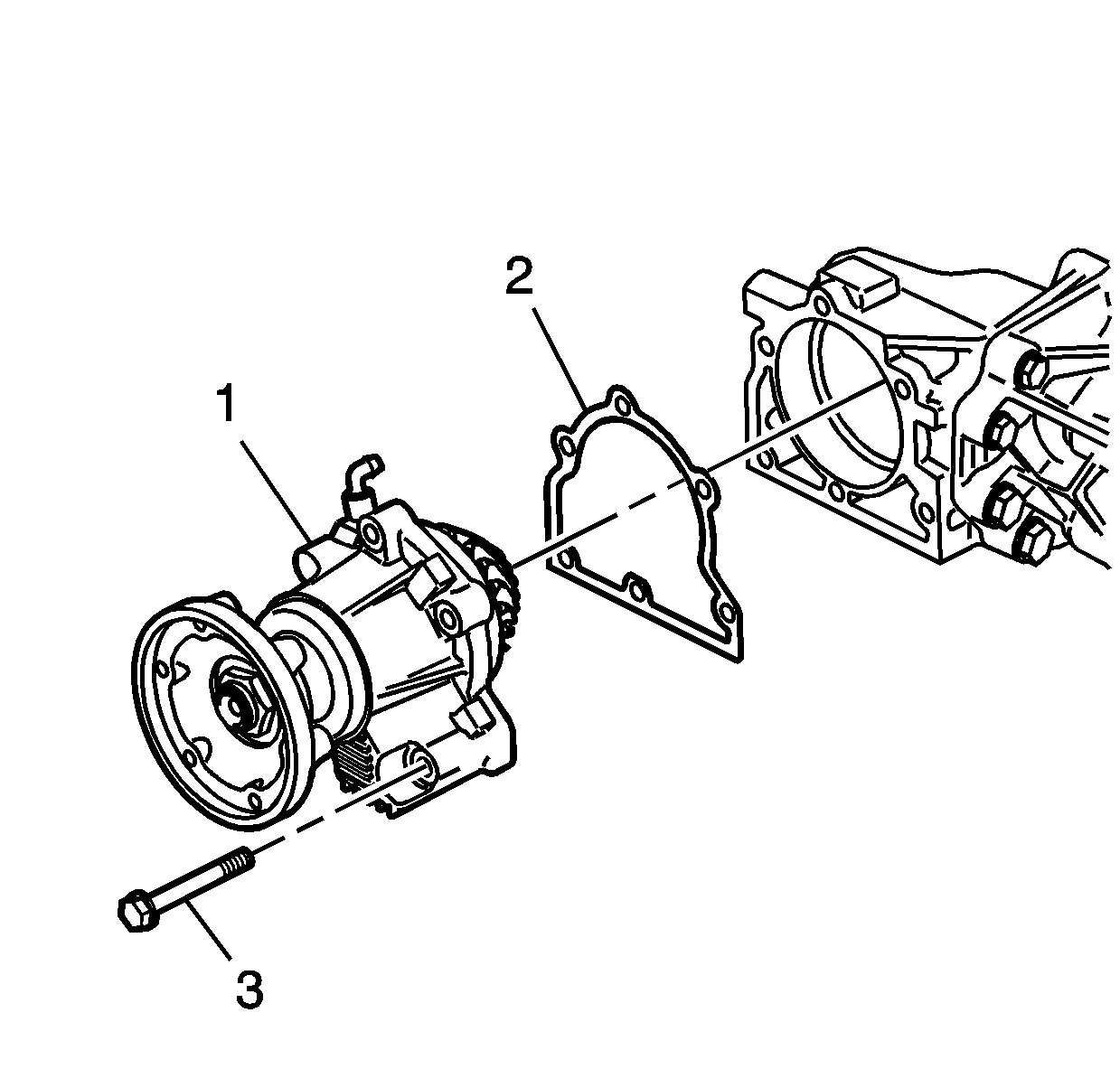
Important: The sealant specified meets General Motors and the manufacturers specifications. Applications for this material are specified for sealing of pipe threads and gasketing of flanges and joint faces. The material supplied may only show "Pipe Thread Sealant" and be white in color. Other compounds have not been tested or validated.
Tighten
Tighten the bolts to 32 N·m (23 lb ft).
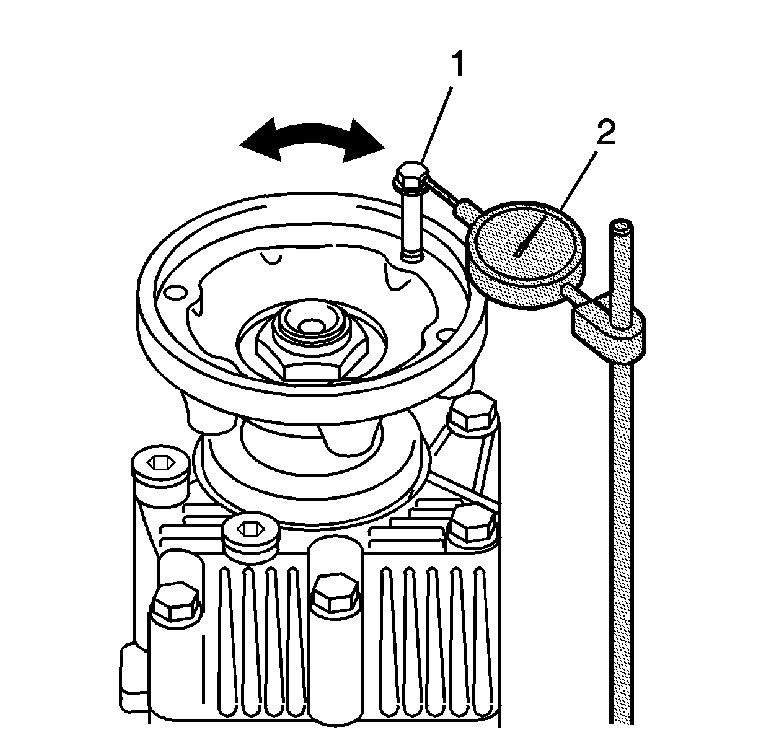
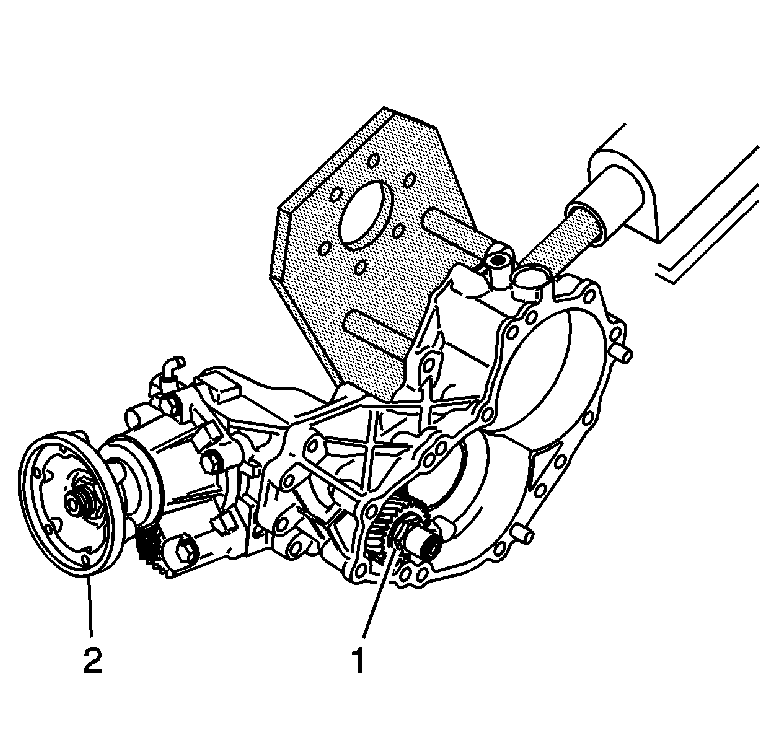
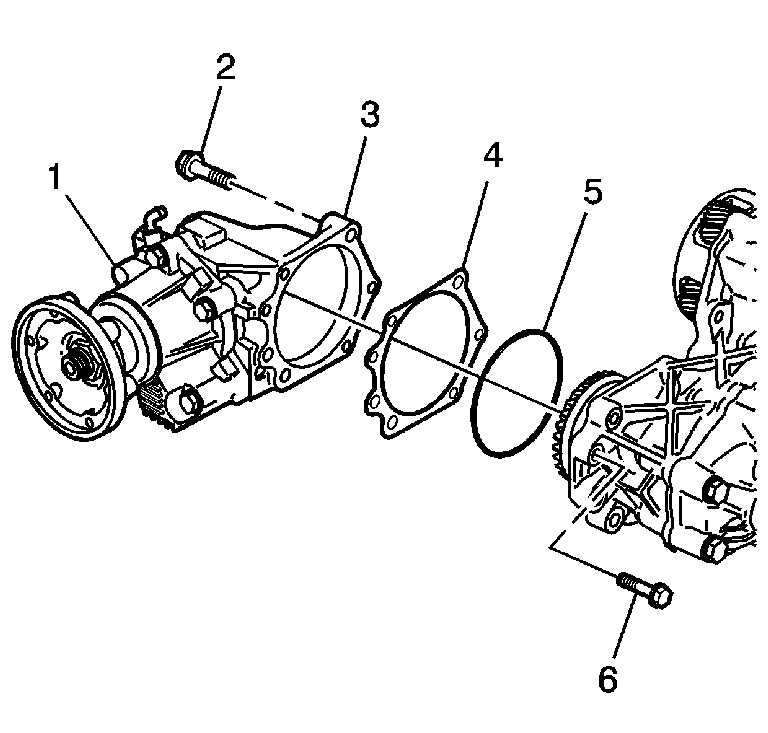
| • | A thicker shim will increase backlash. |
| • | A thinner shim will decrease backlash. |
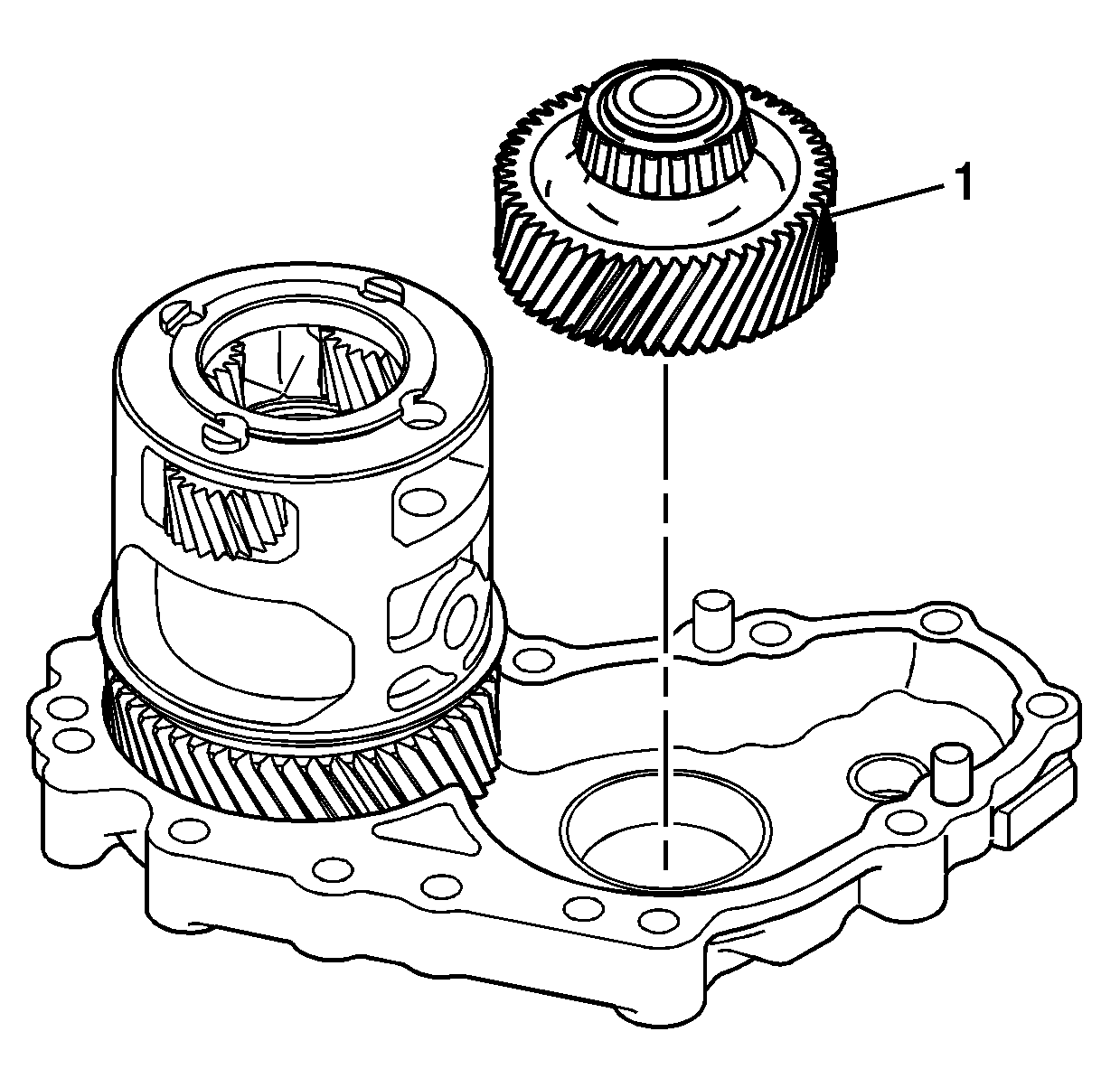
Important: The sealant specified meets General Motors and the manufacturers specifications. Applications for this material are specified for sealing of pipe threads and gasketing of flanges and joint faces. The material supplied may only show "Pipe Thread Sealant" and be white in color. Other compounds have not been tested or validated.

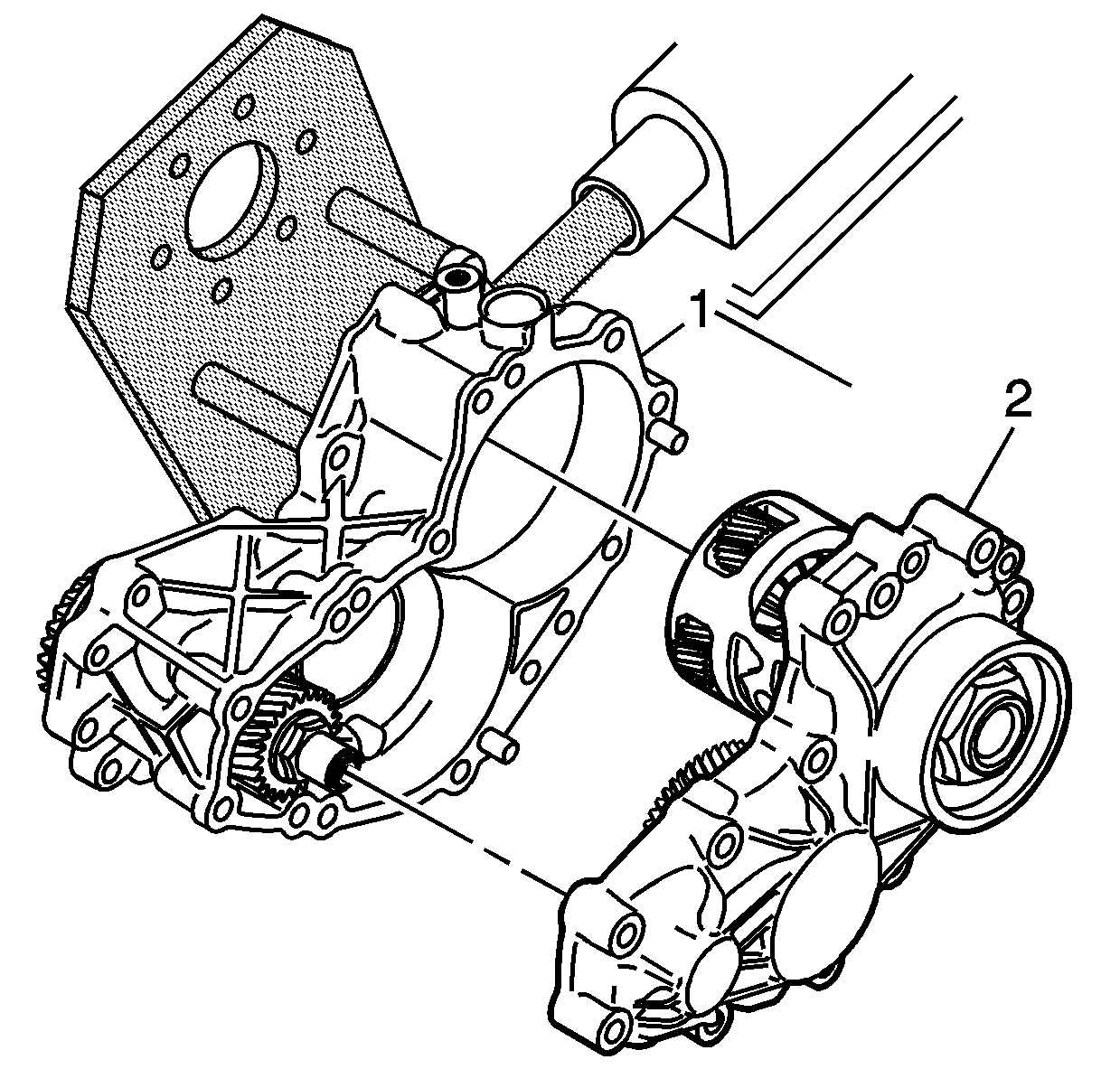
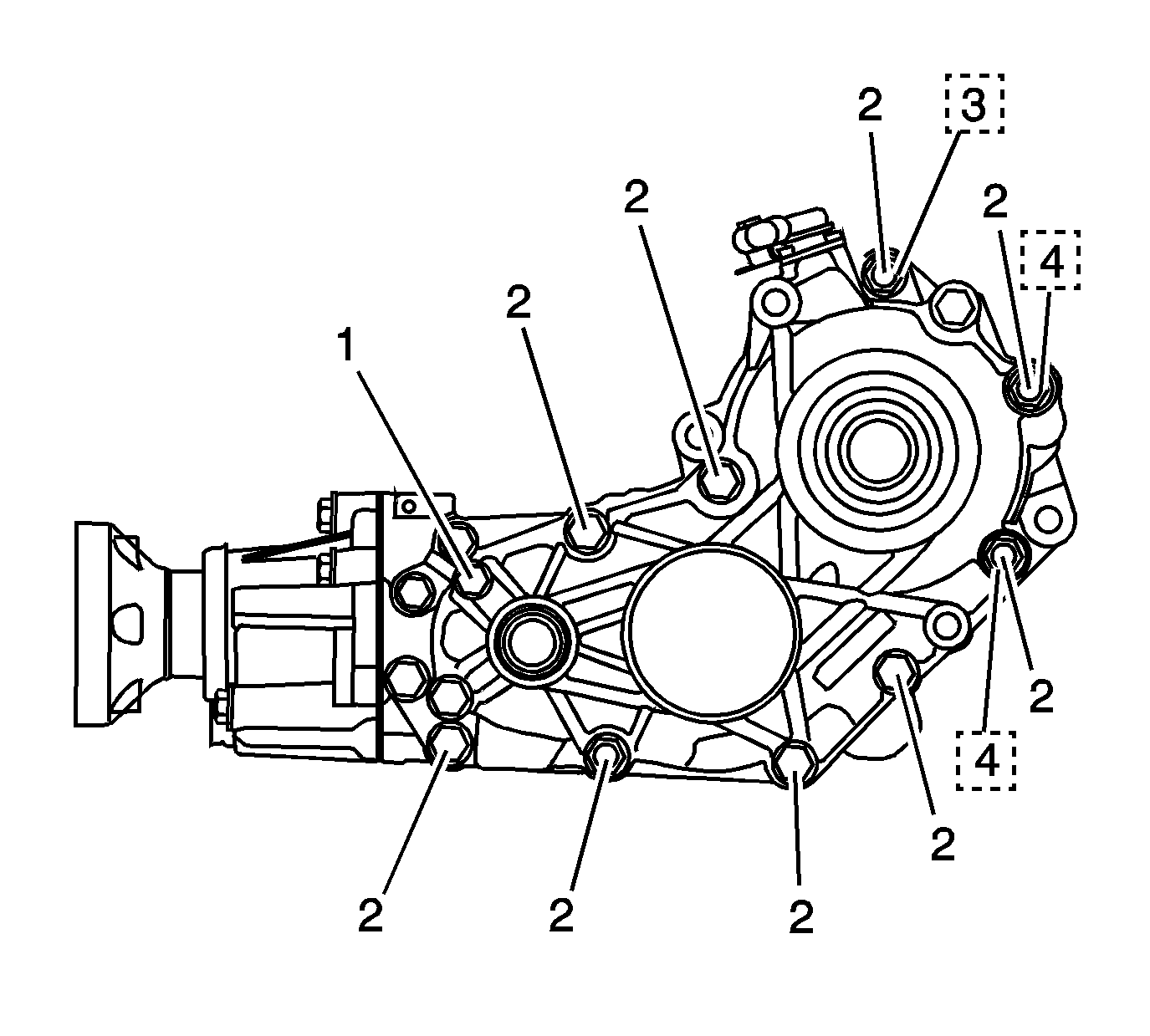
Tighten
Tighten the M8x40 case bolt (1) to 32 N·m (24 lb ft).
Tighten
Tighten the M10x60 case bolts (2) to 60 N·m (44 lb ft)
Tighten
Tighten the M10x50 case bolt (3) LY7 only to 60 N·m (44 lb ft)
Tighten
Tighten the M10x75 case stud bolts (4) LY7 only to 60 N·m (44 lb ft)
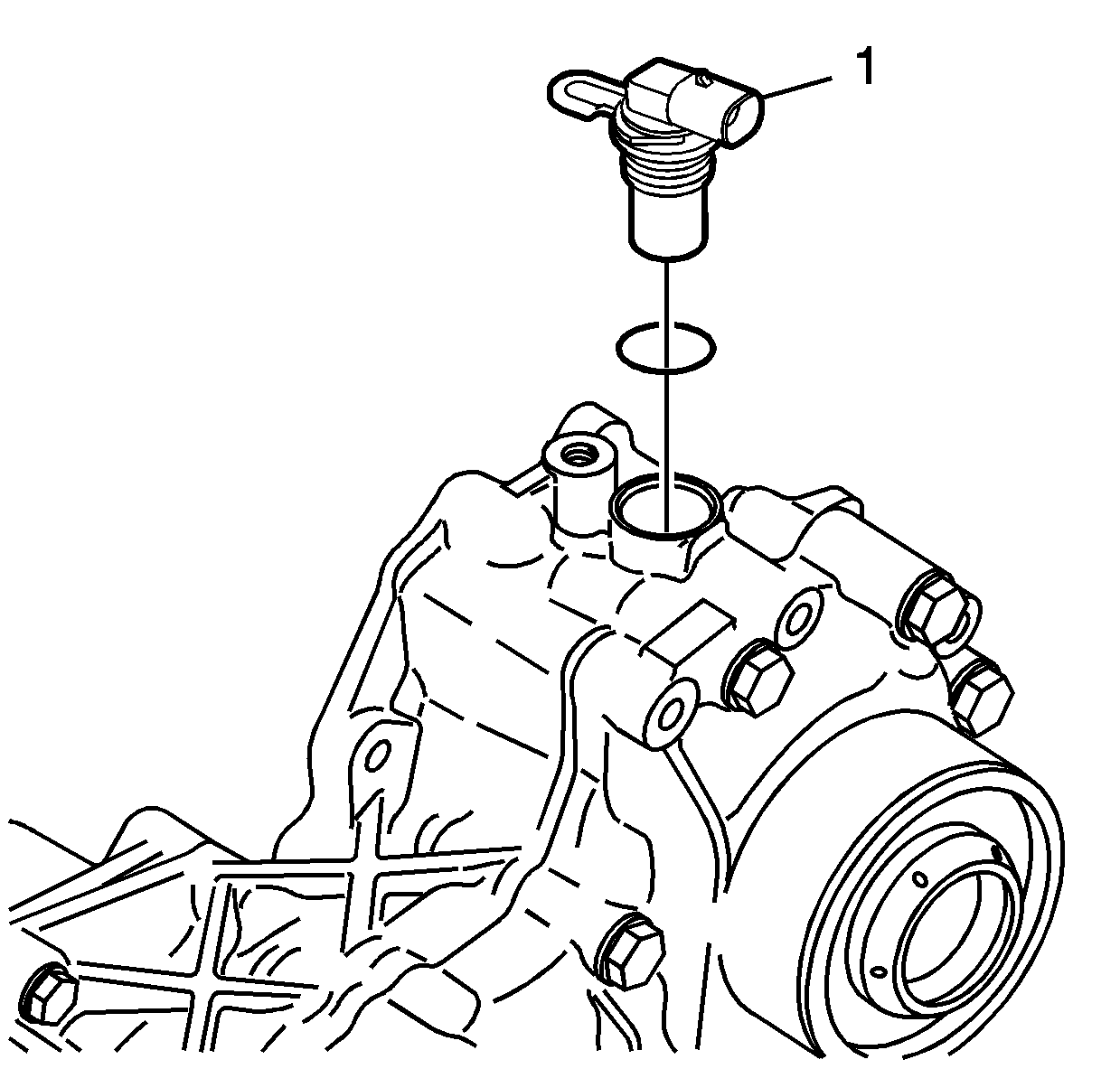
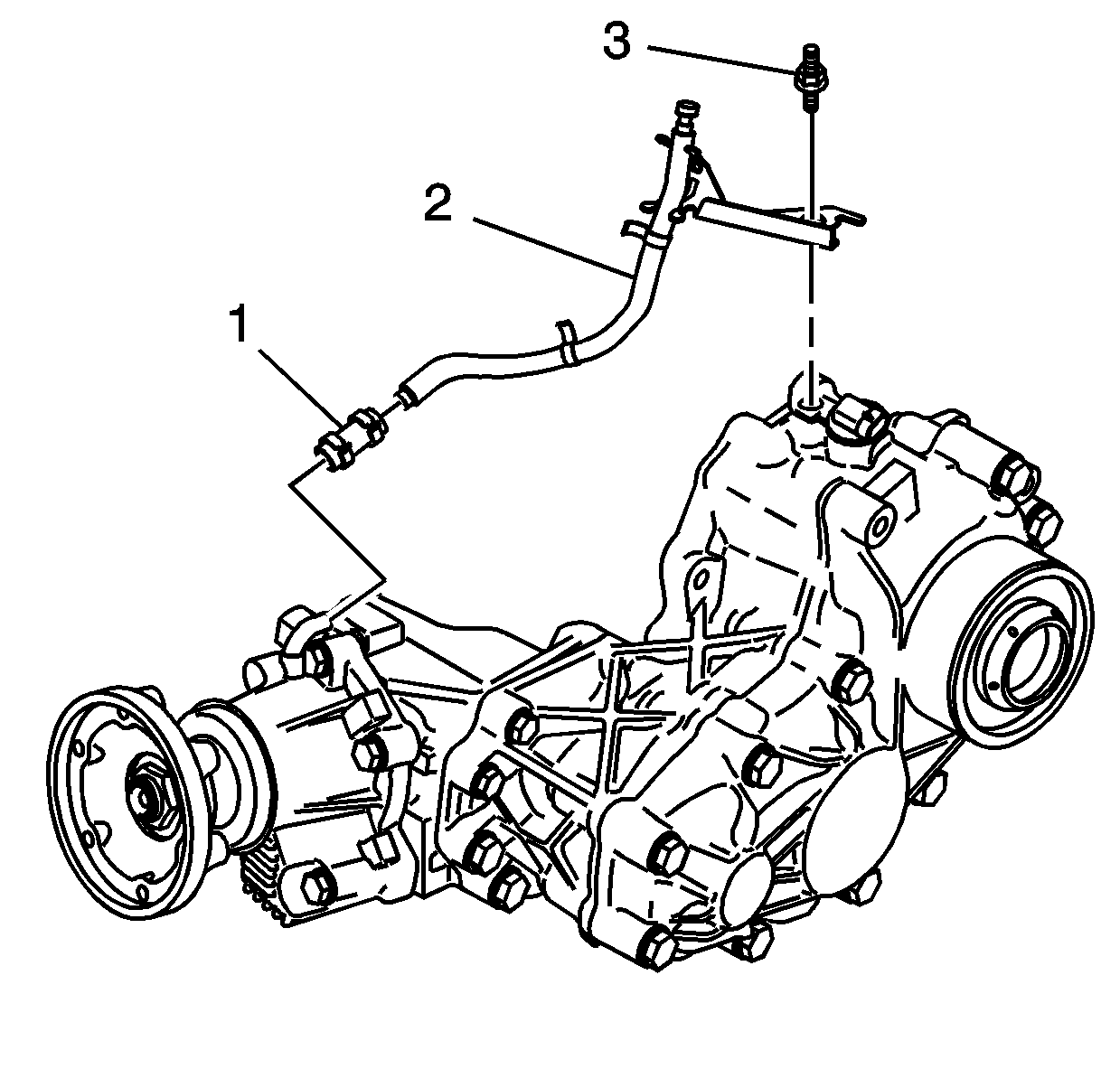
Tighten
Tighten the vent hose/speed sensor bolt to 30 N·m (22 lb ft).
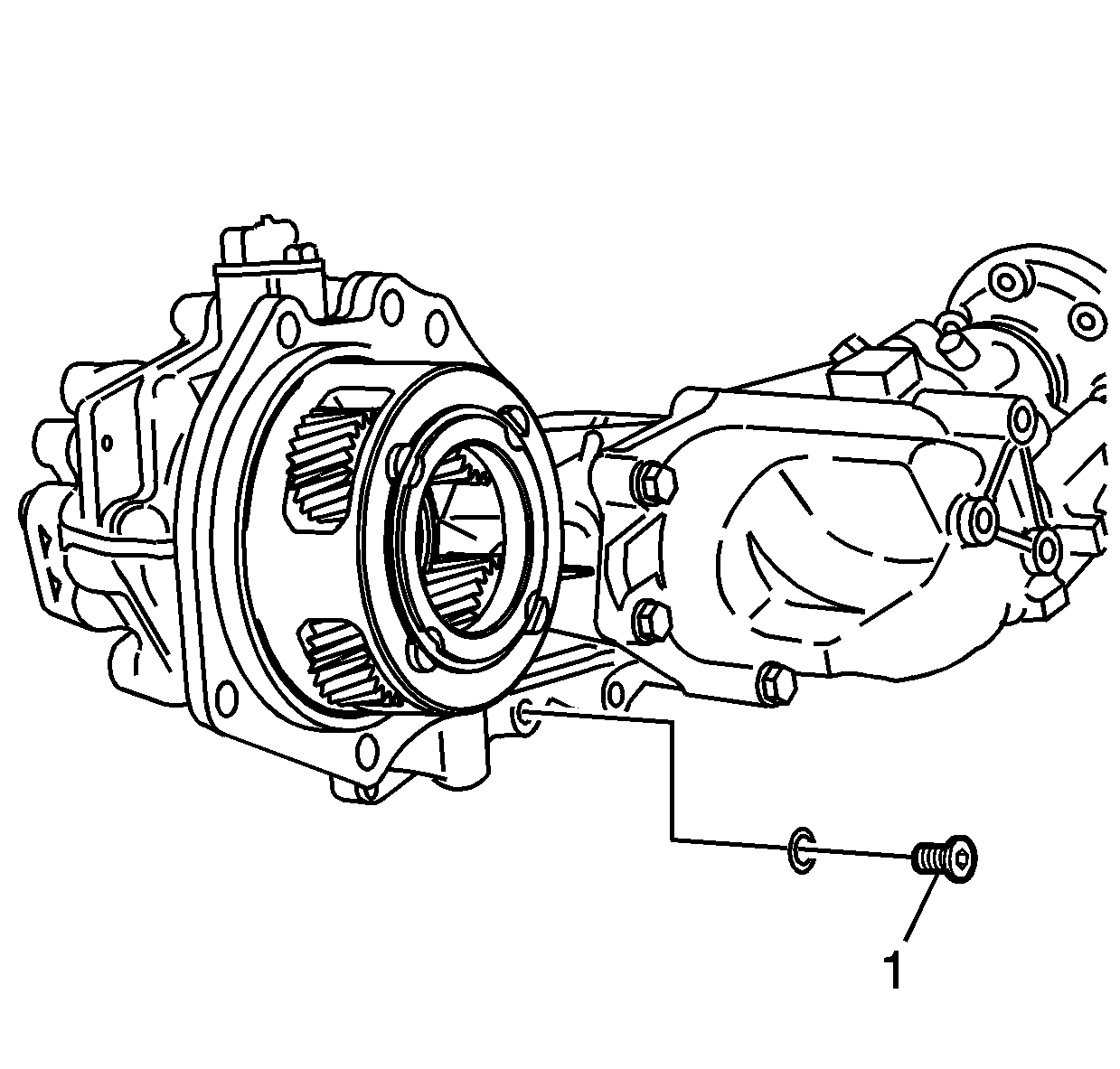
Tighten
Tighten the drain plug to 32 N·m (24 lb ft).
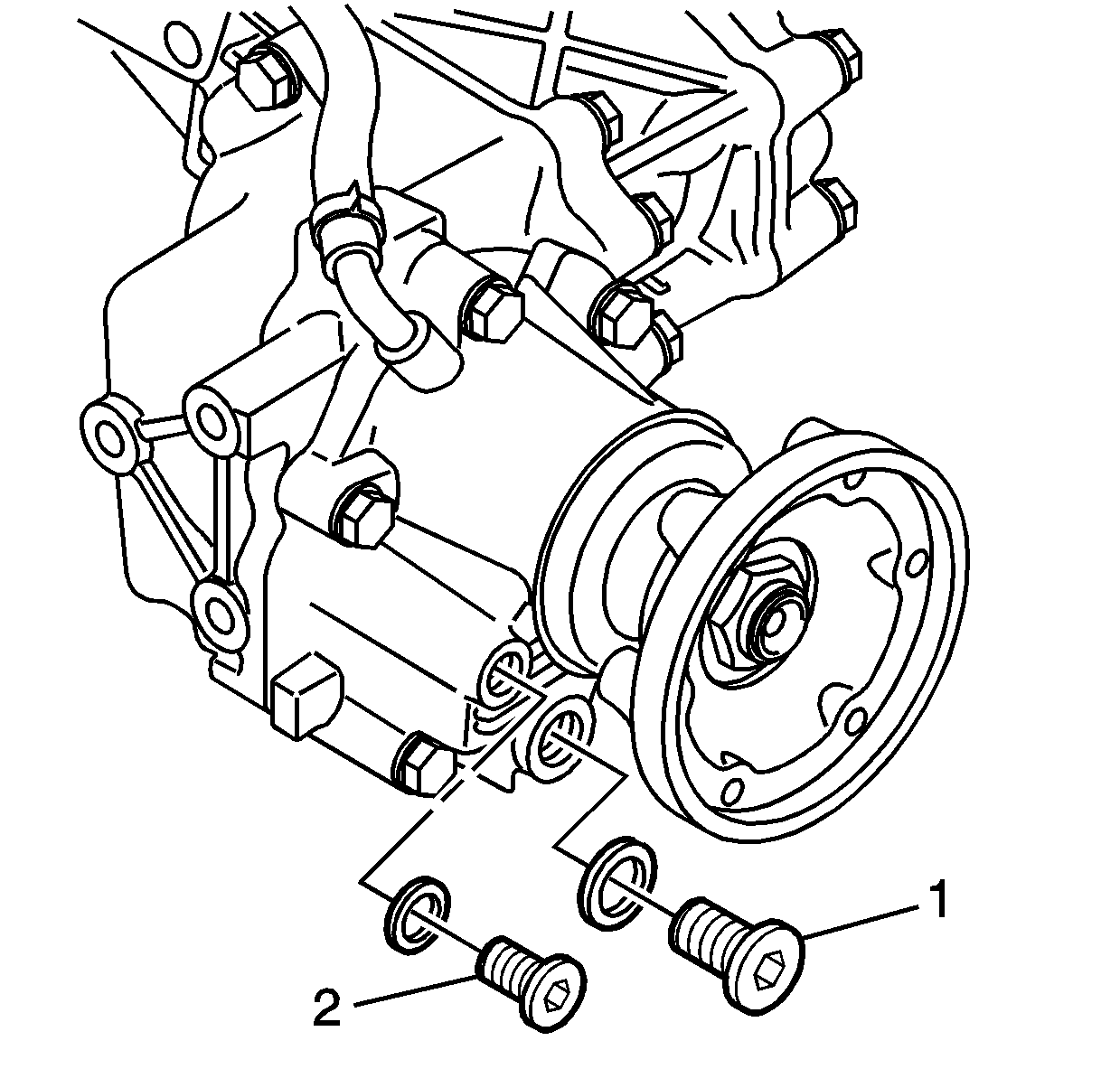
Tighten
Tighten the drain plug to 32 N·m (24 lb ft).
Important: The end play clearance between the transmission and transfer case internal components is adjusted by selection of the proper size selective washer located behind the transmission sun gear. The transmission-to-transfer case washer selection procedure must be performed each time a transmission and/or transfer case assembly or the internal components, excluding gaskets and seals, are replaced.
Refer to the Installation and Fluid Fill Procedure in Transfer Case and/or Seal Replacement in Transfer Case - Steyr.
